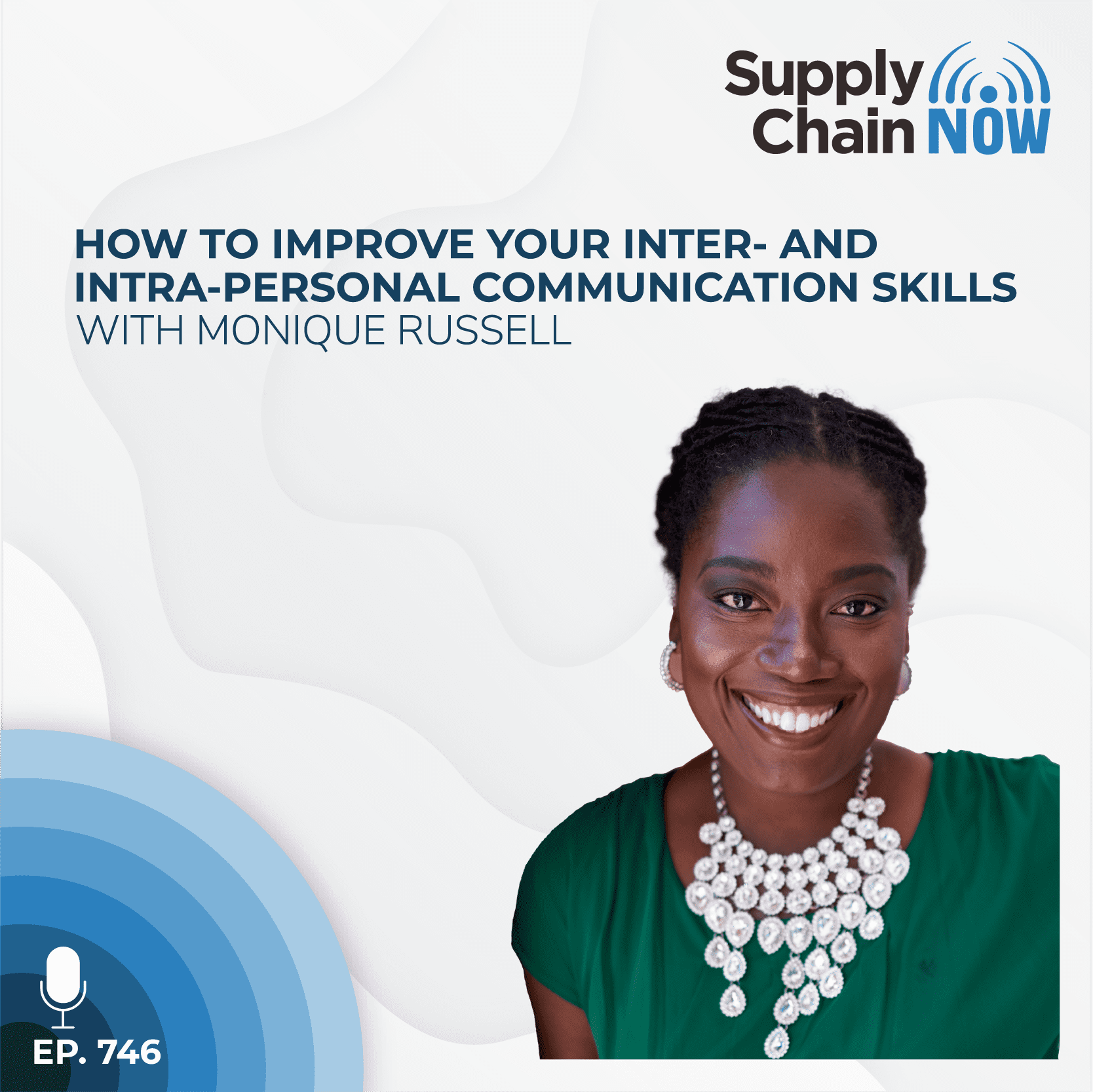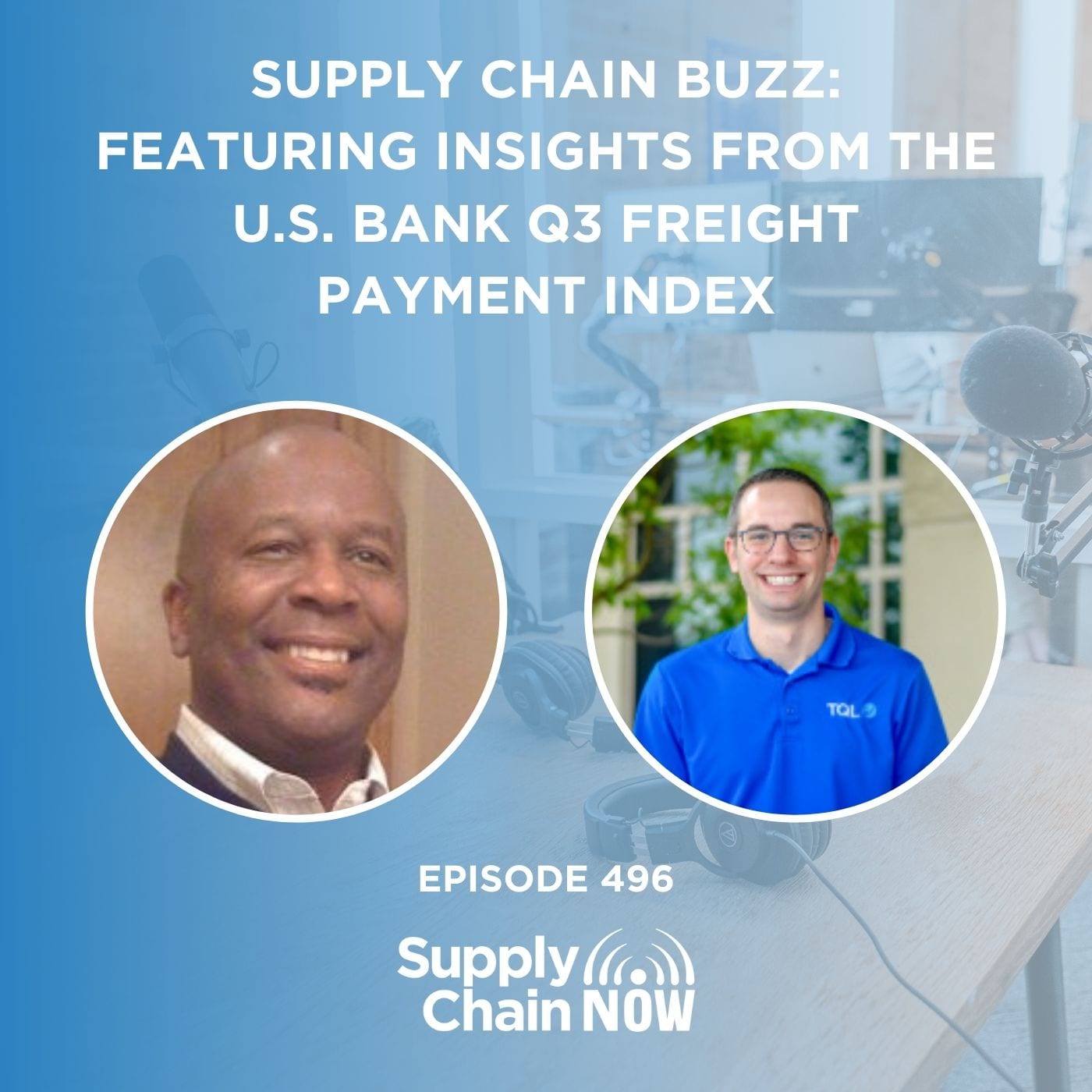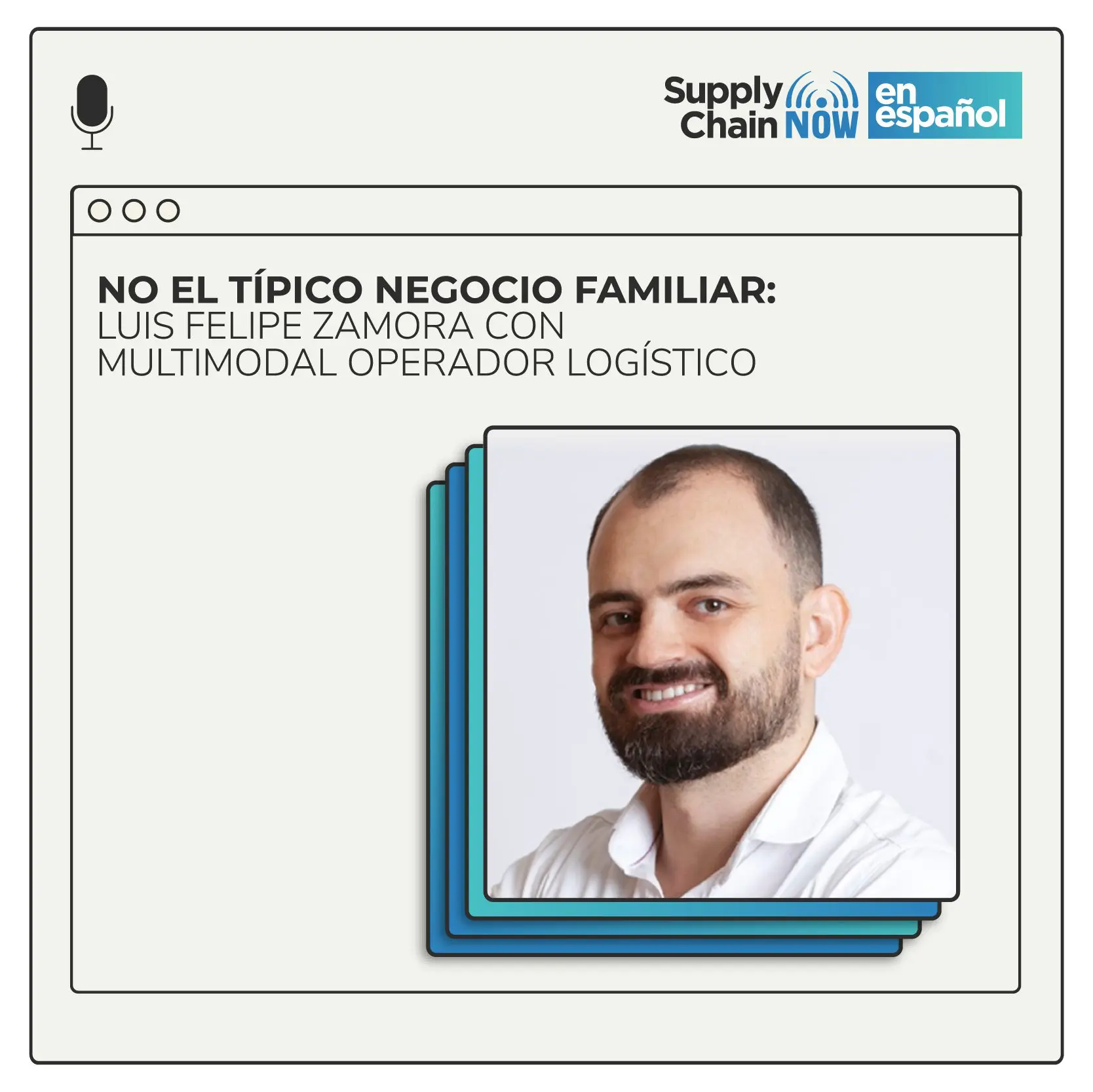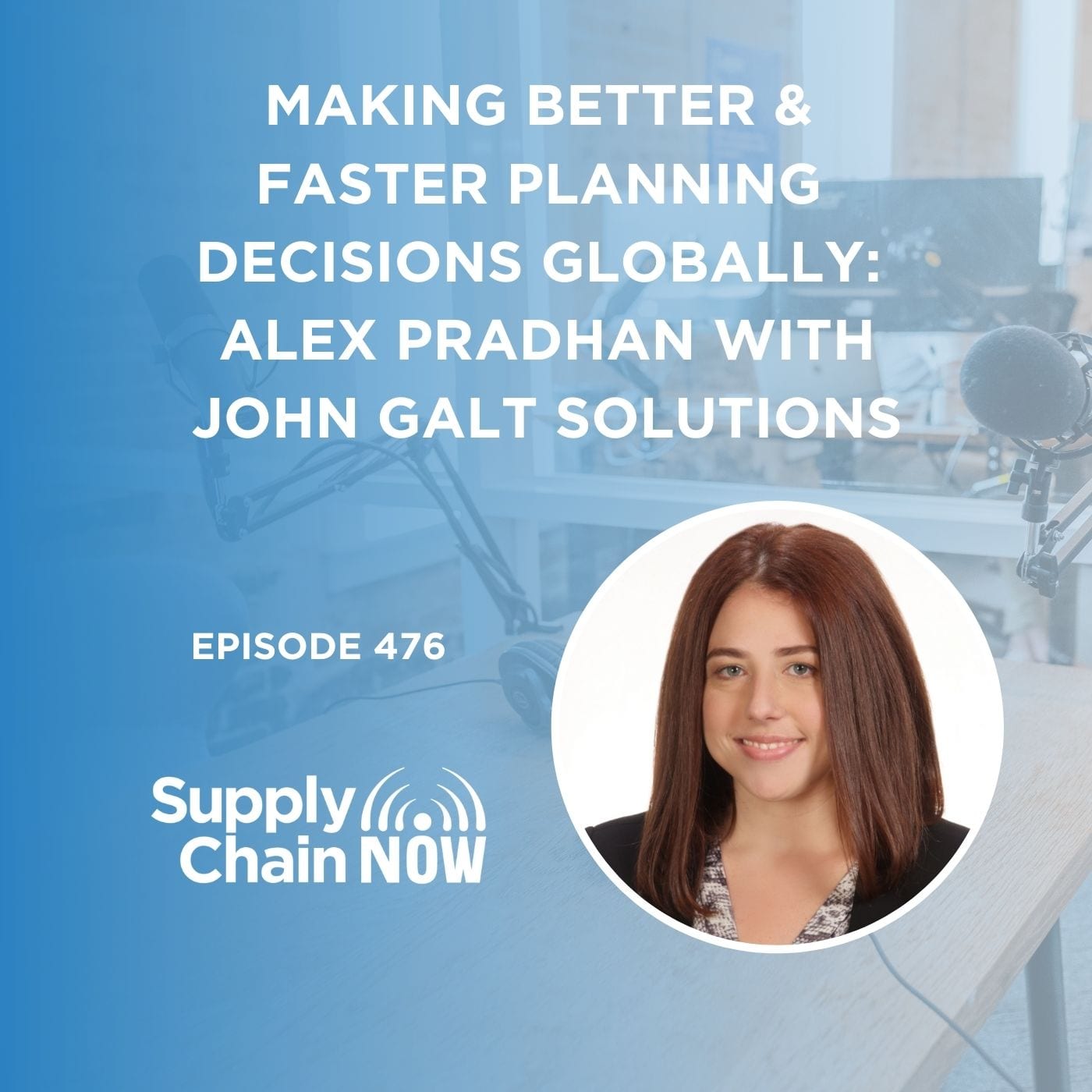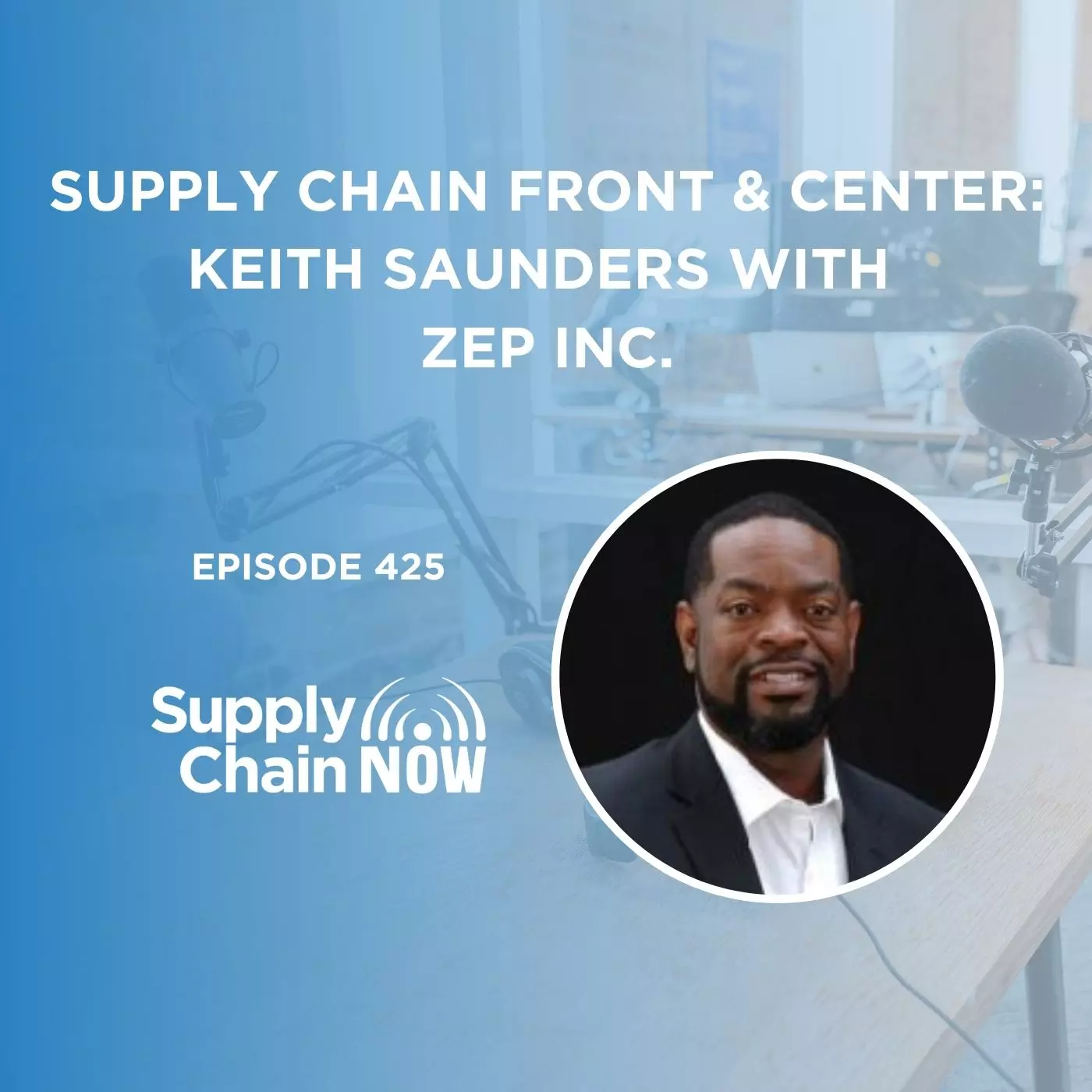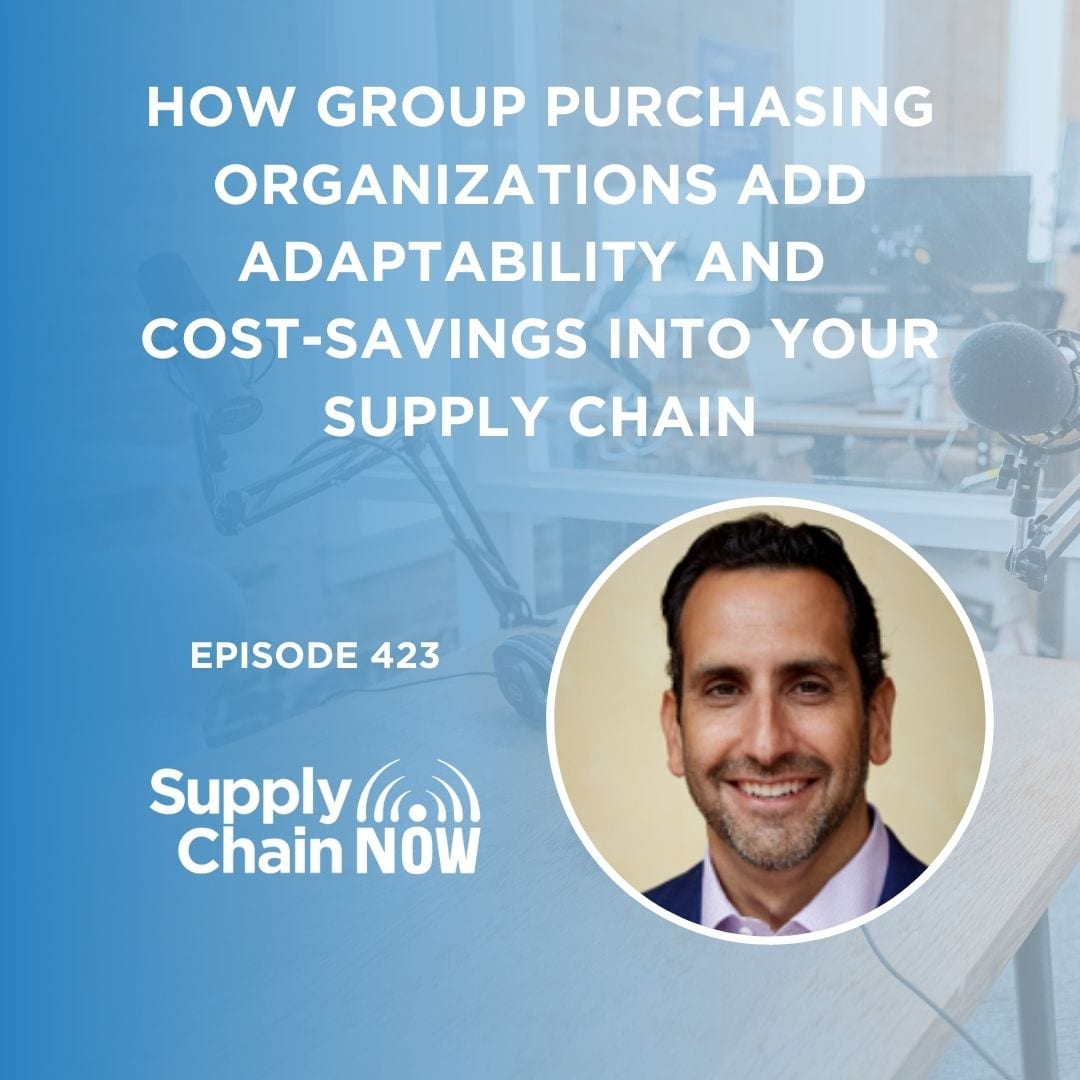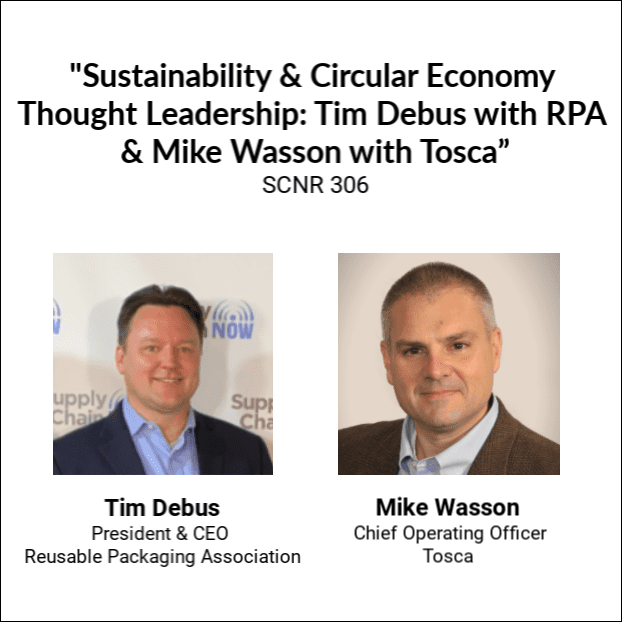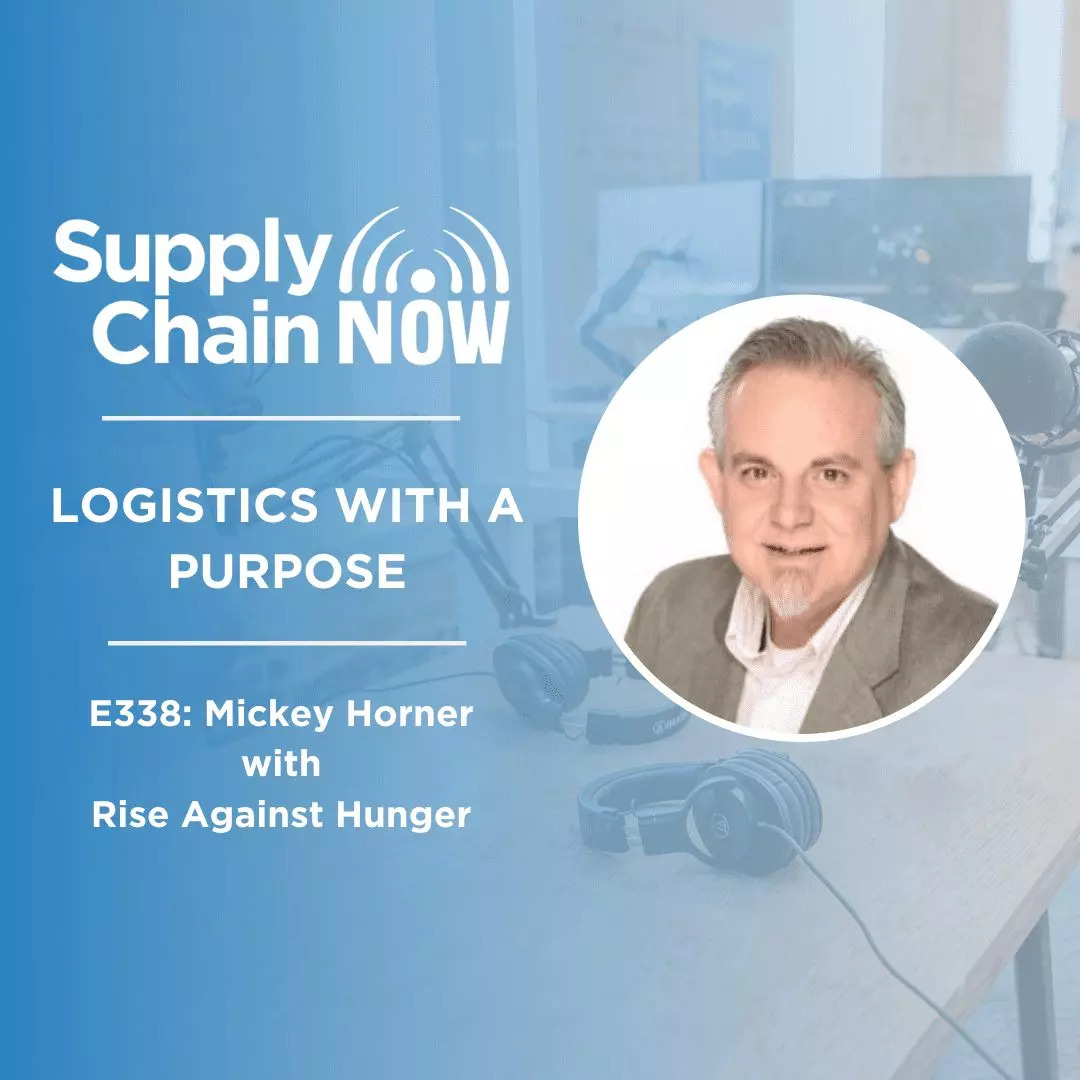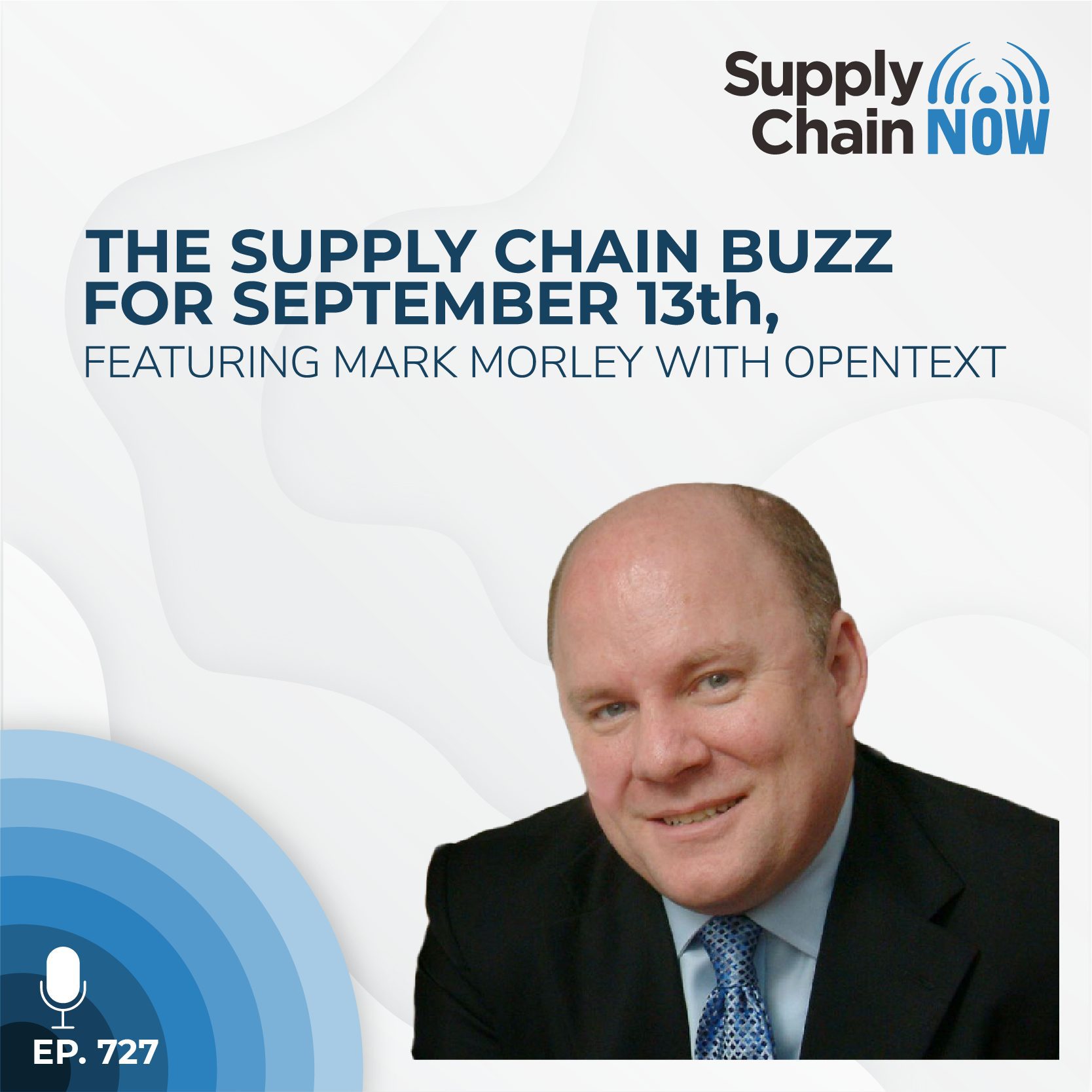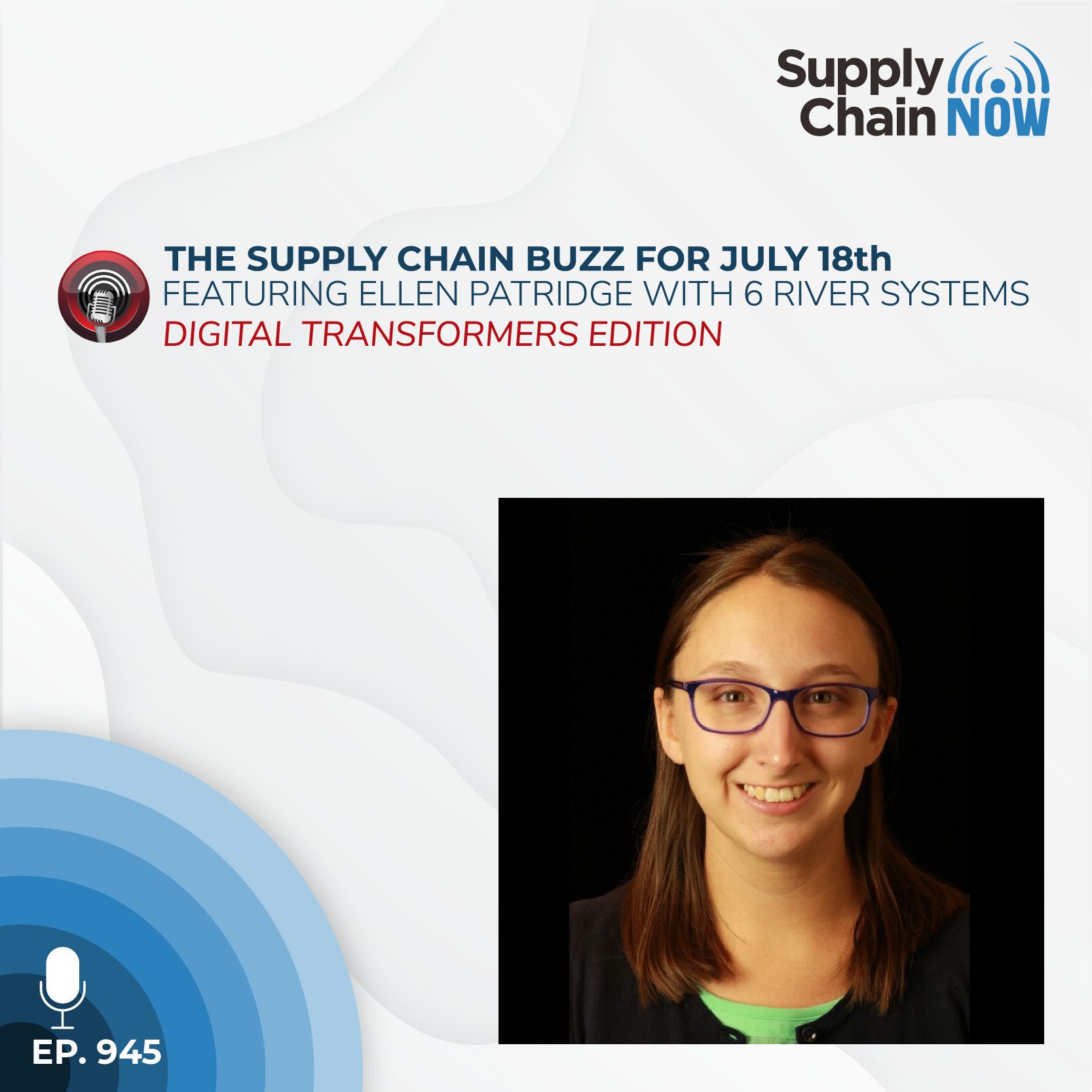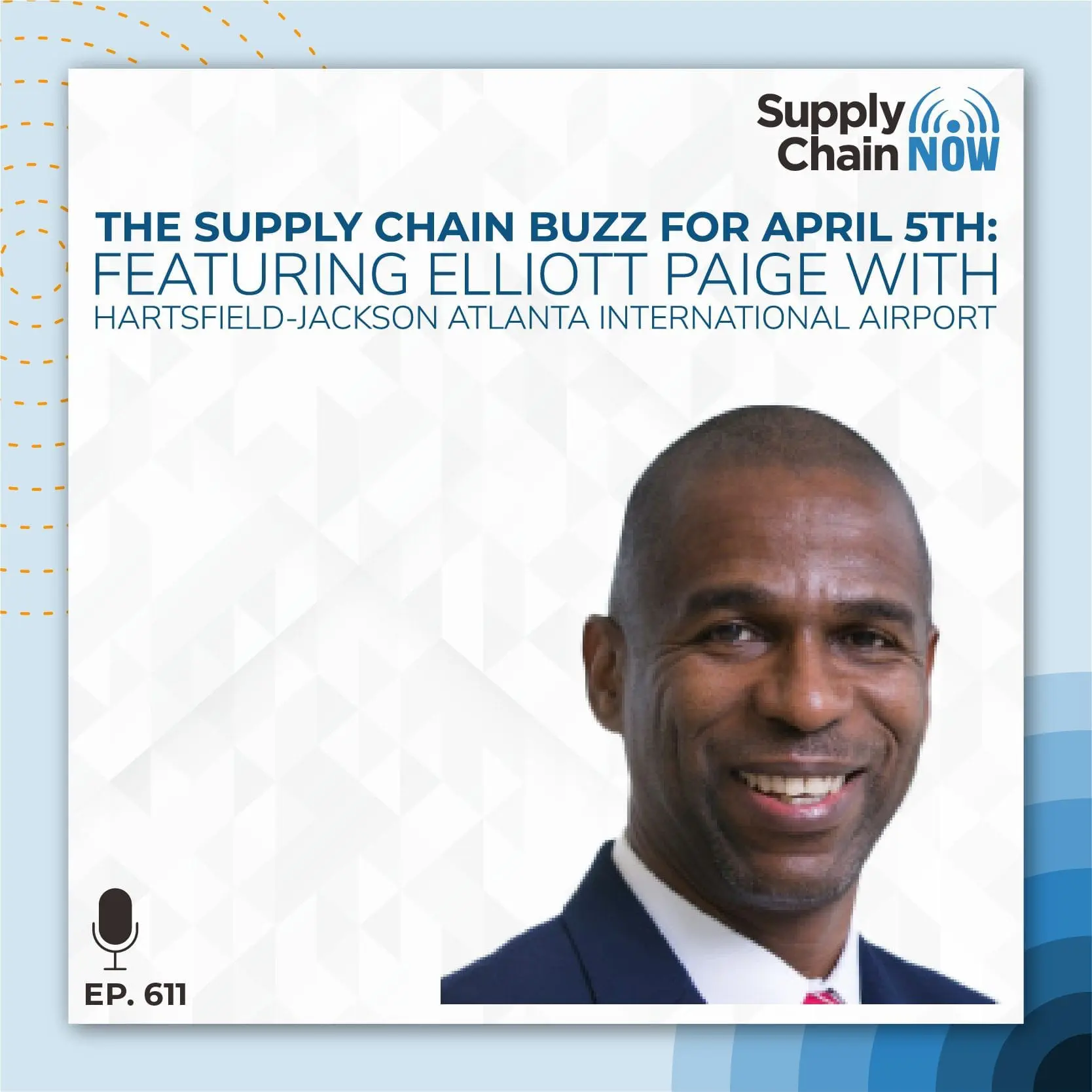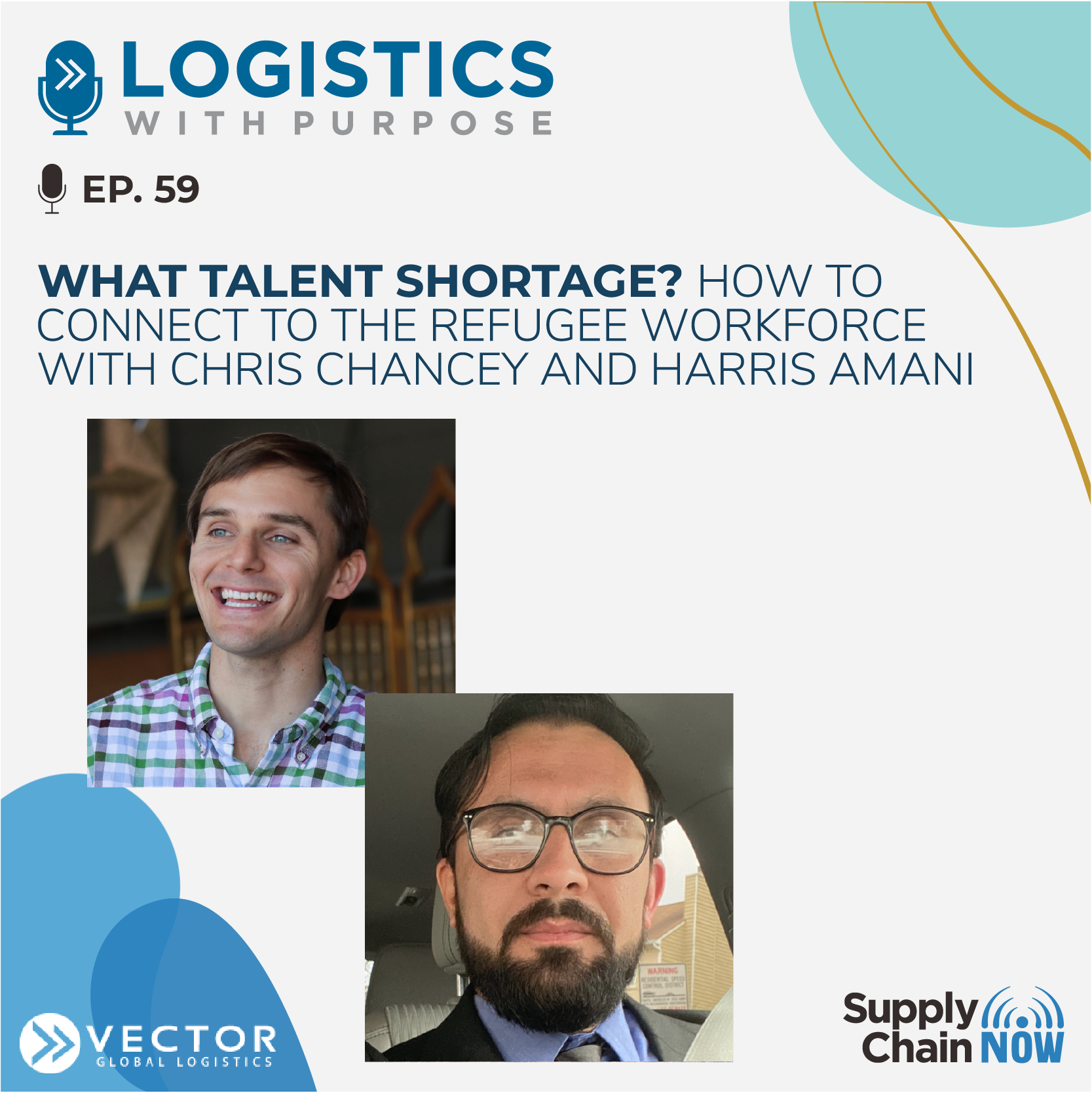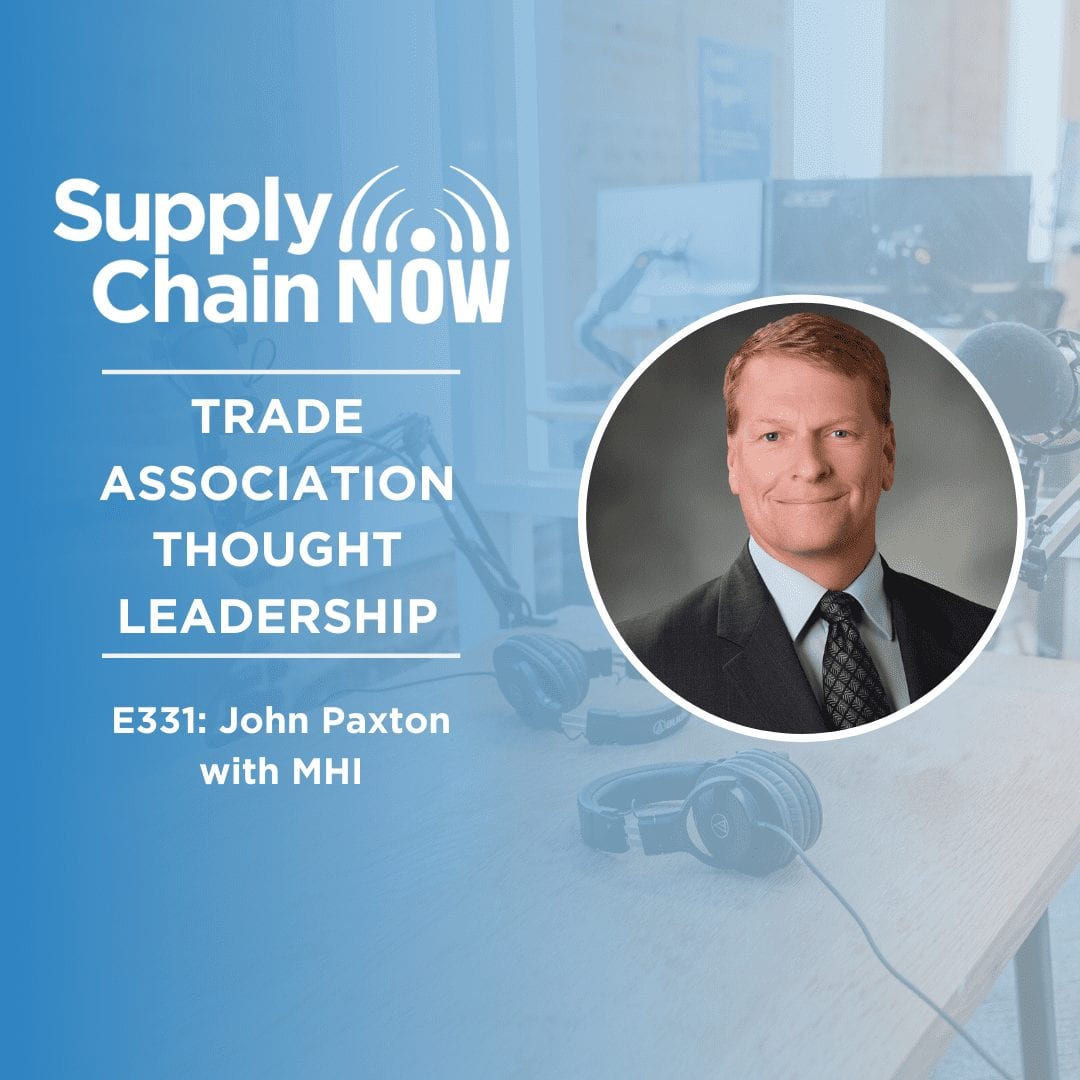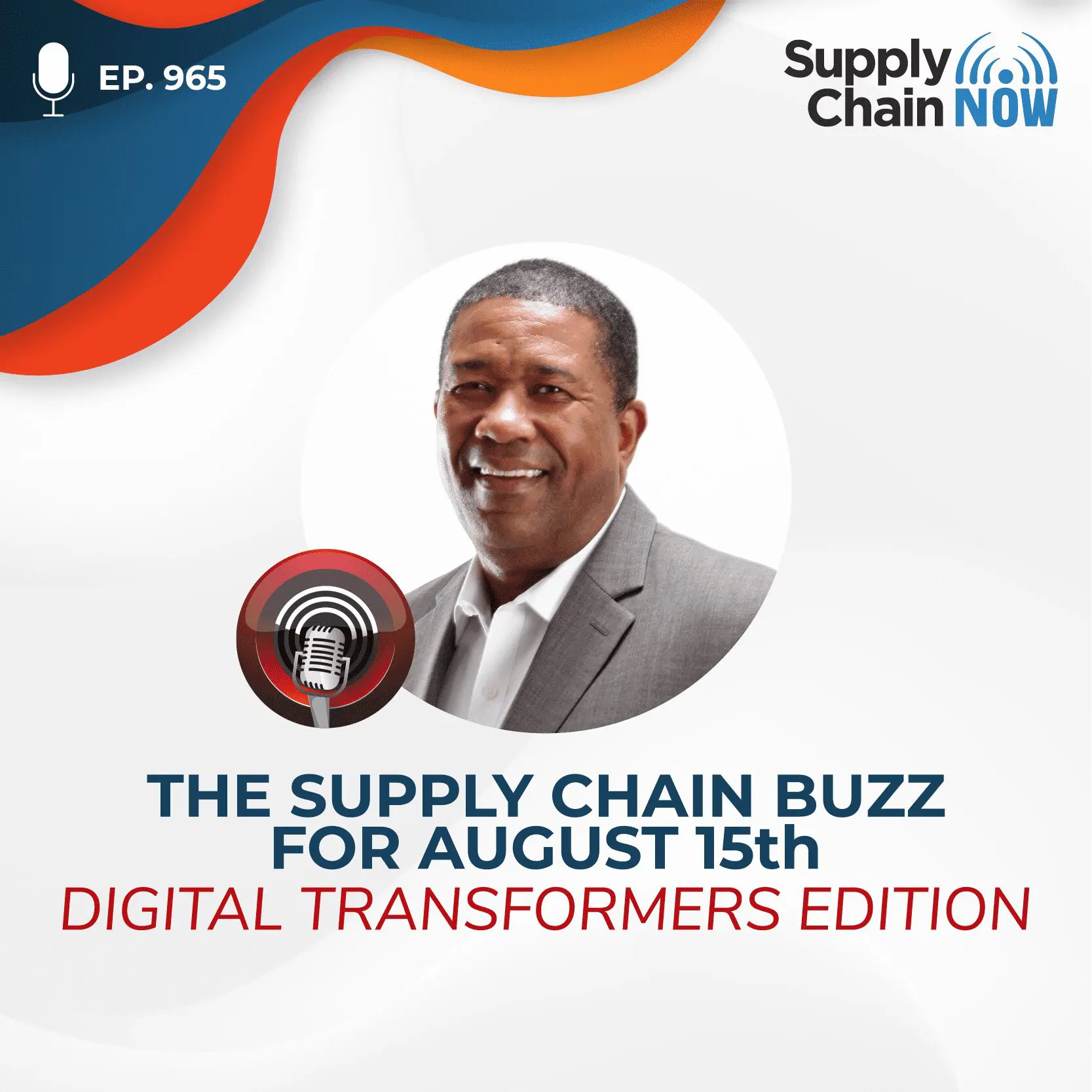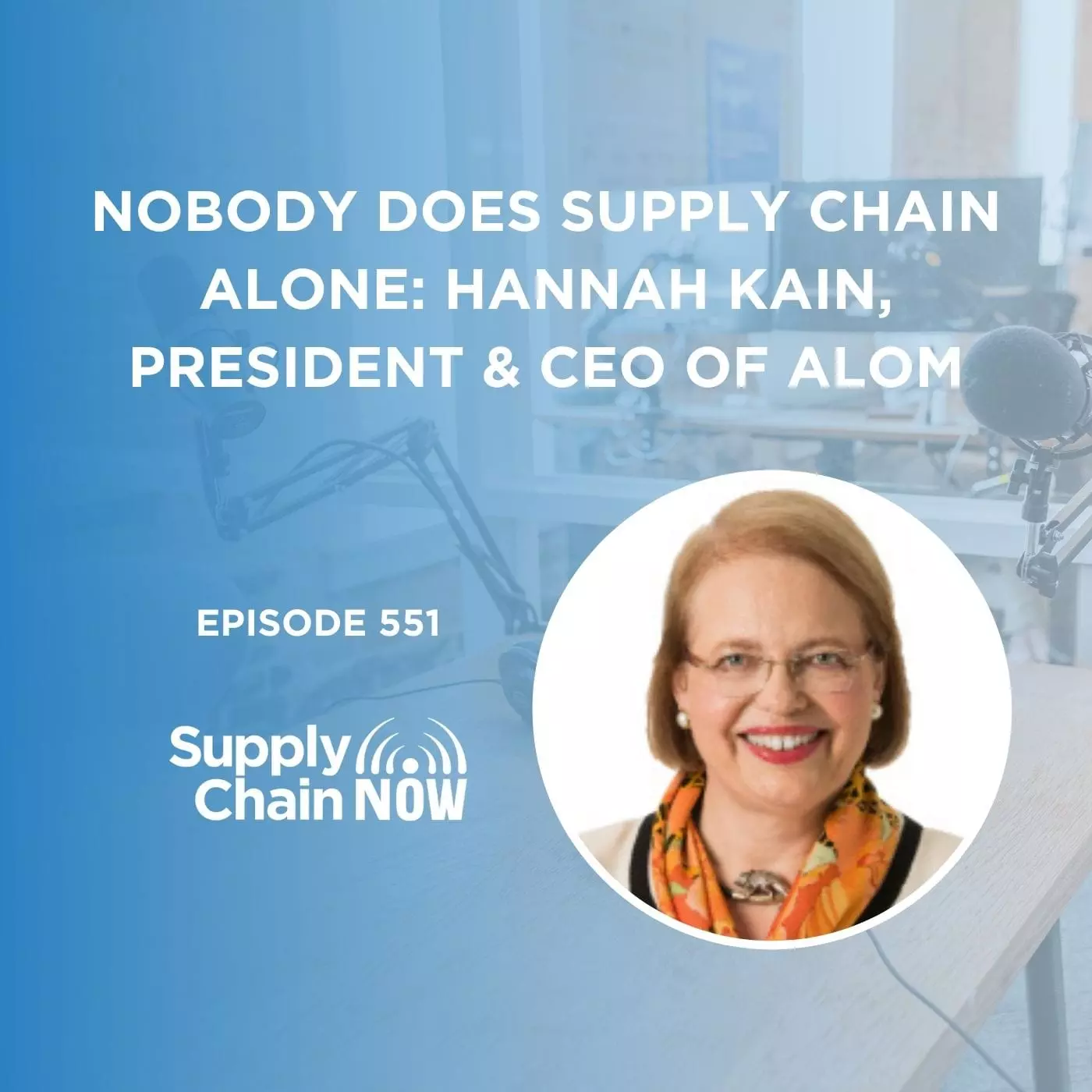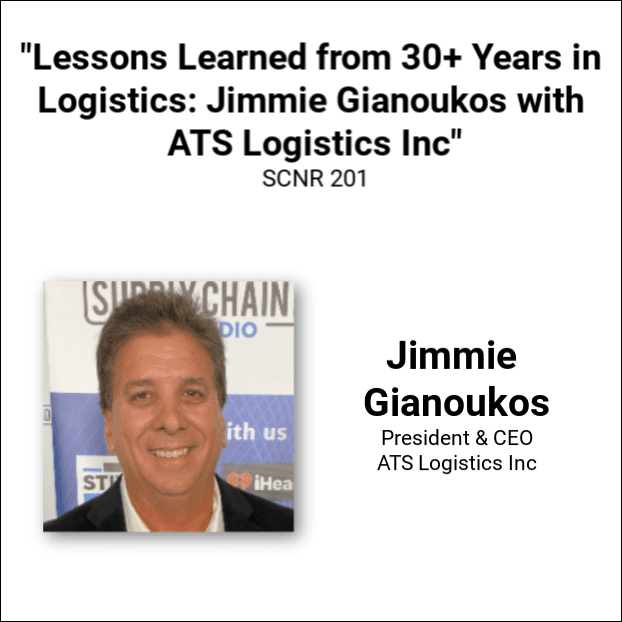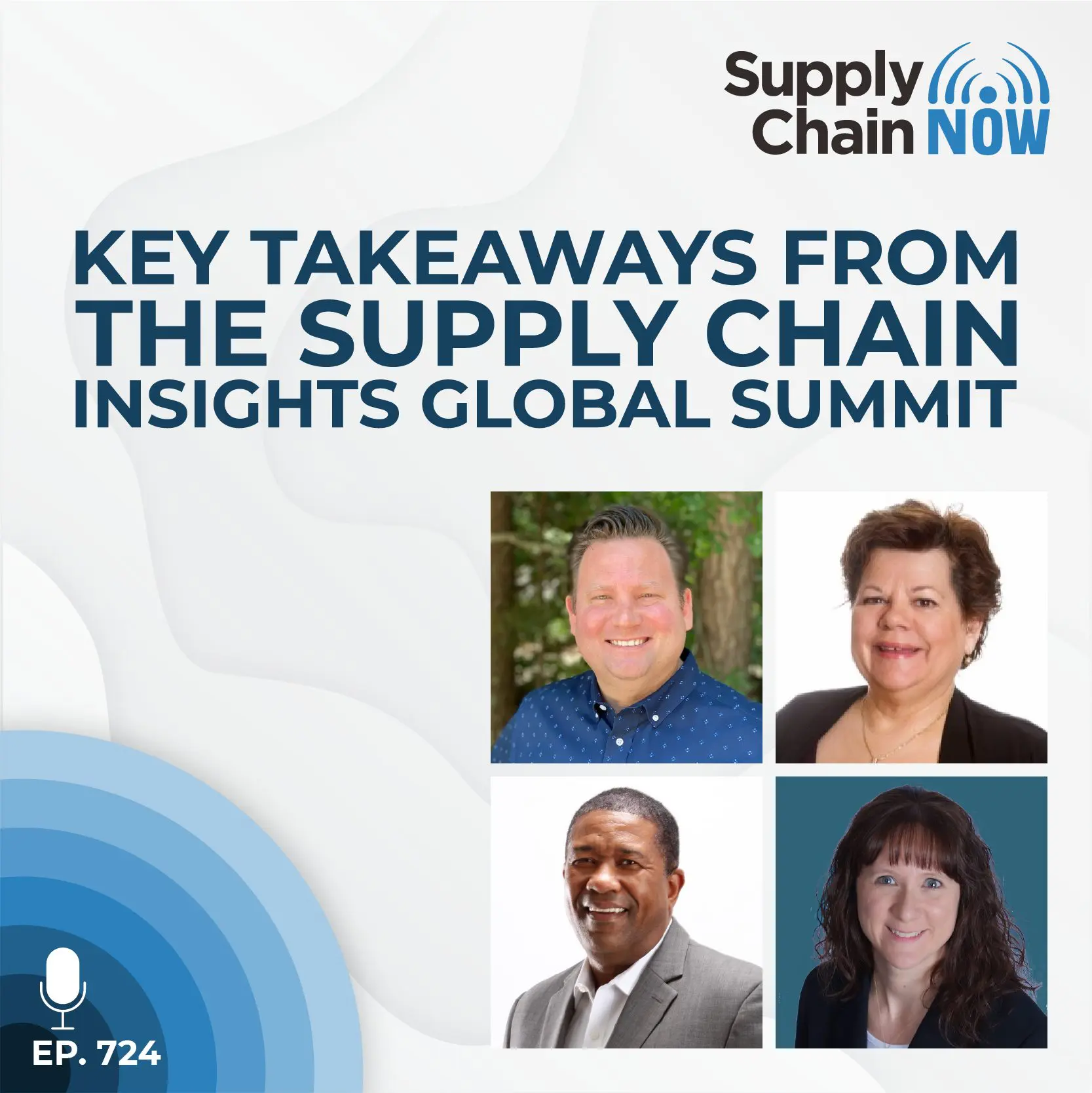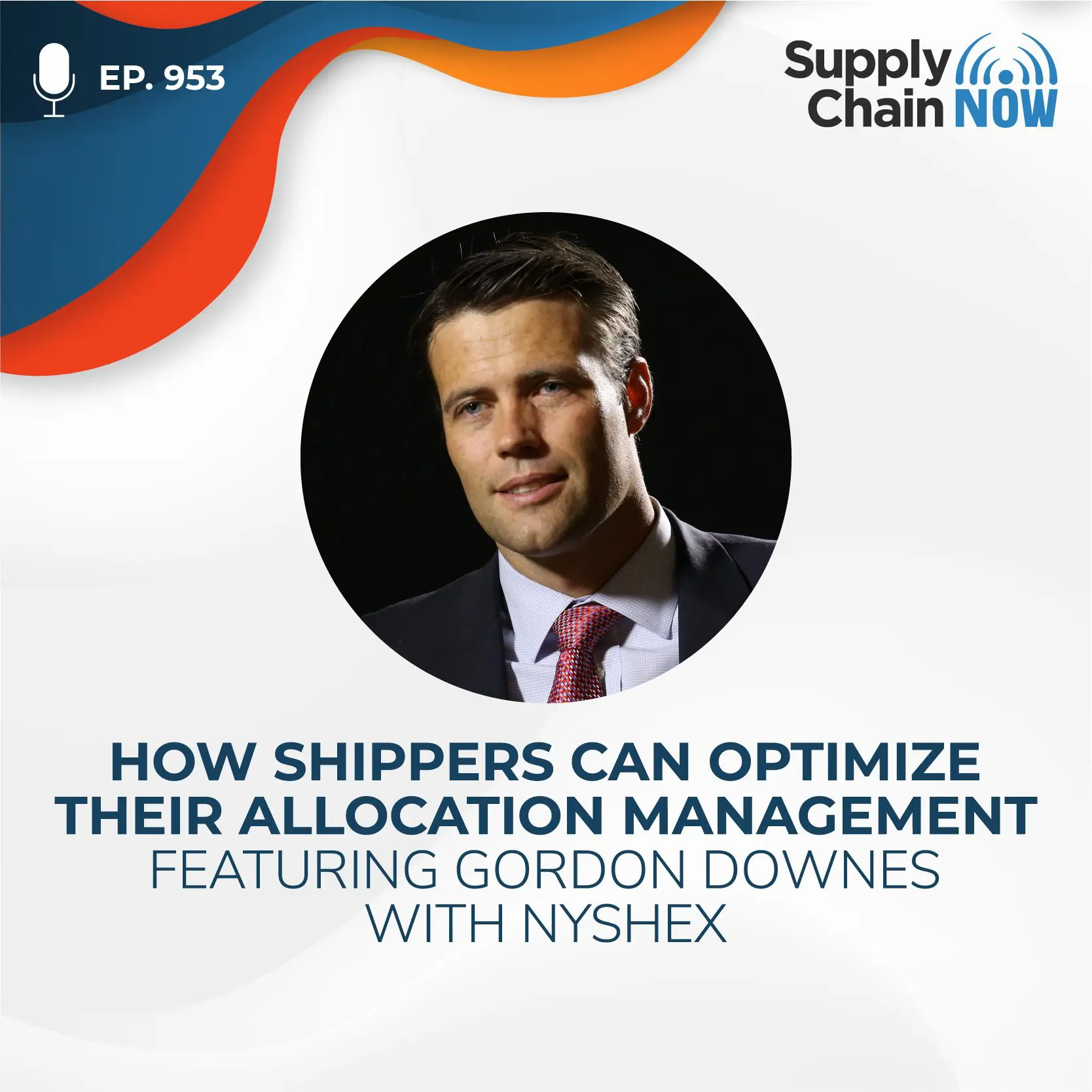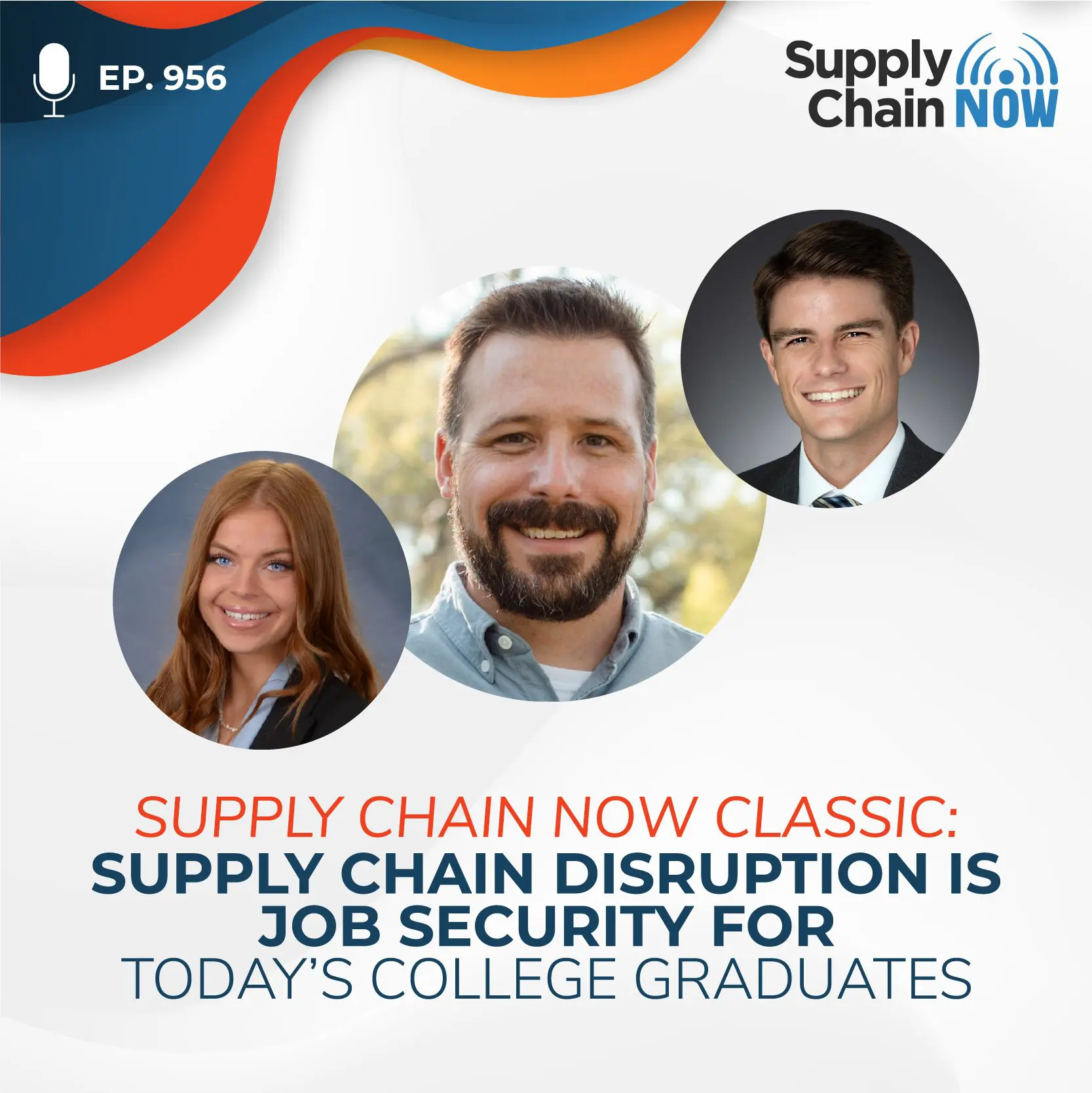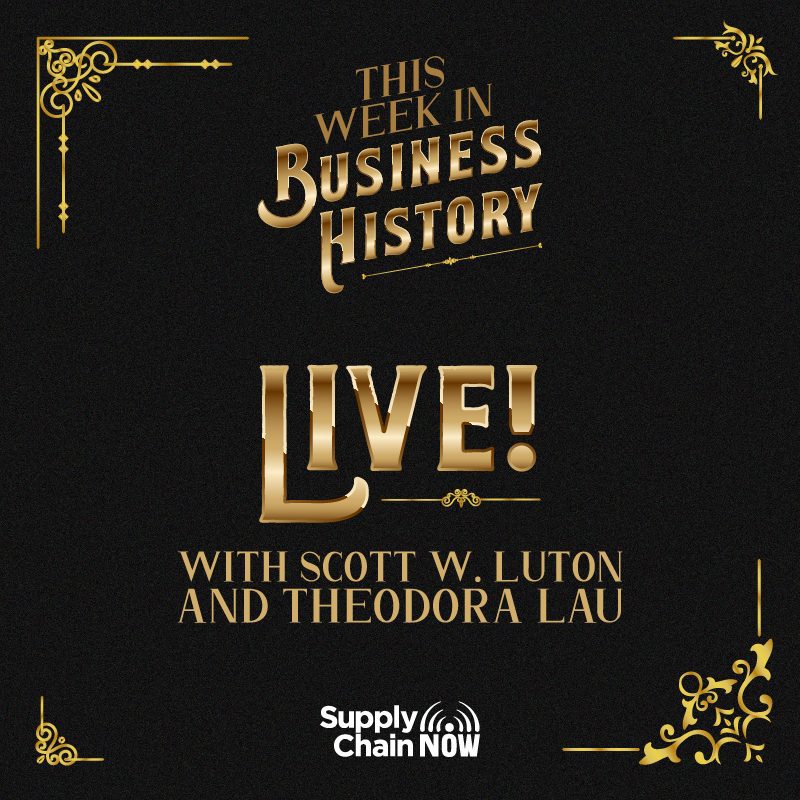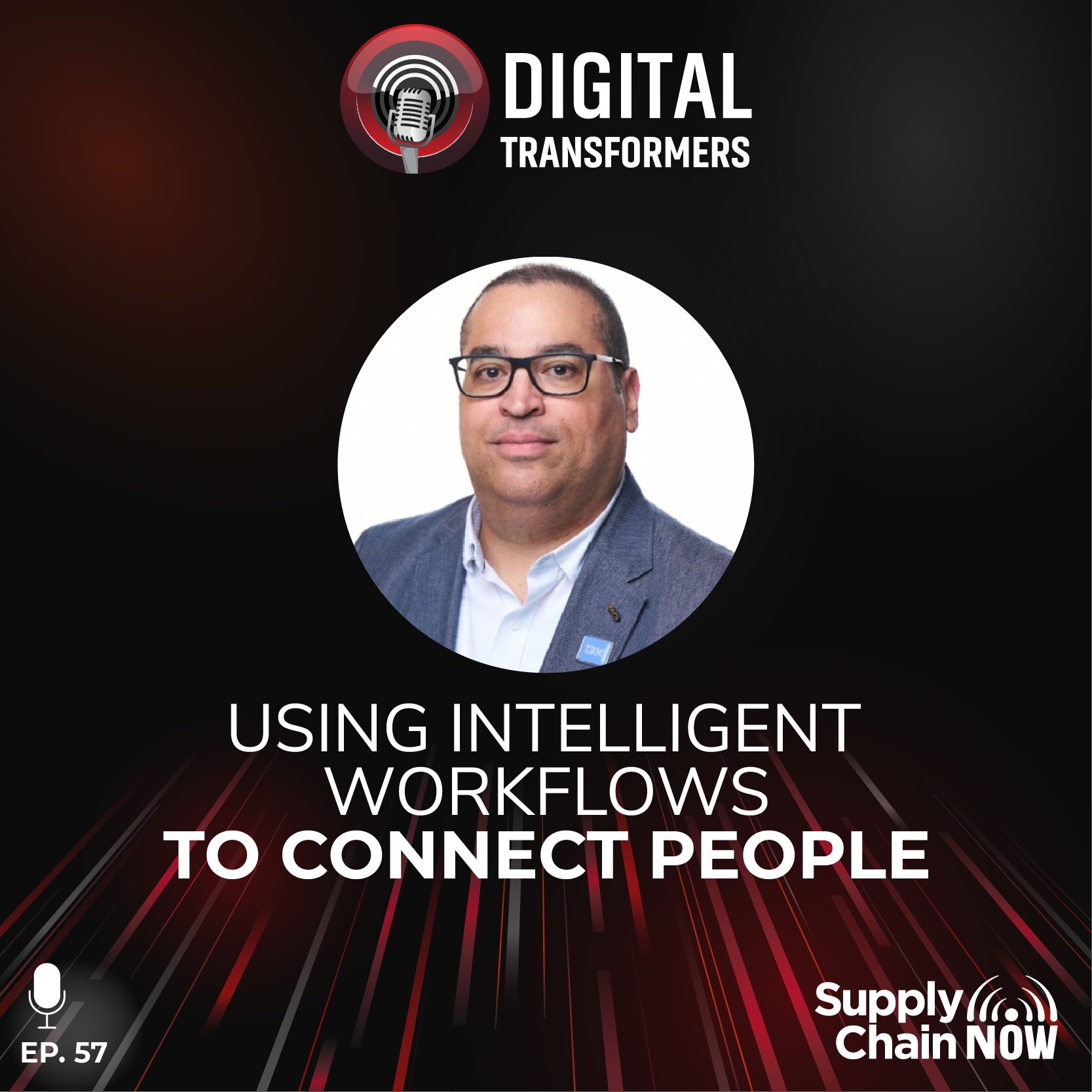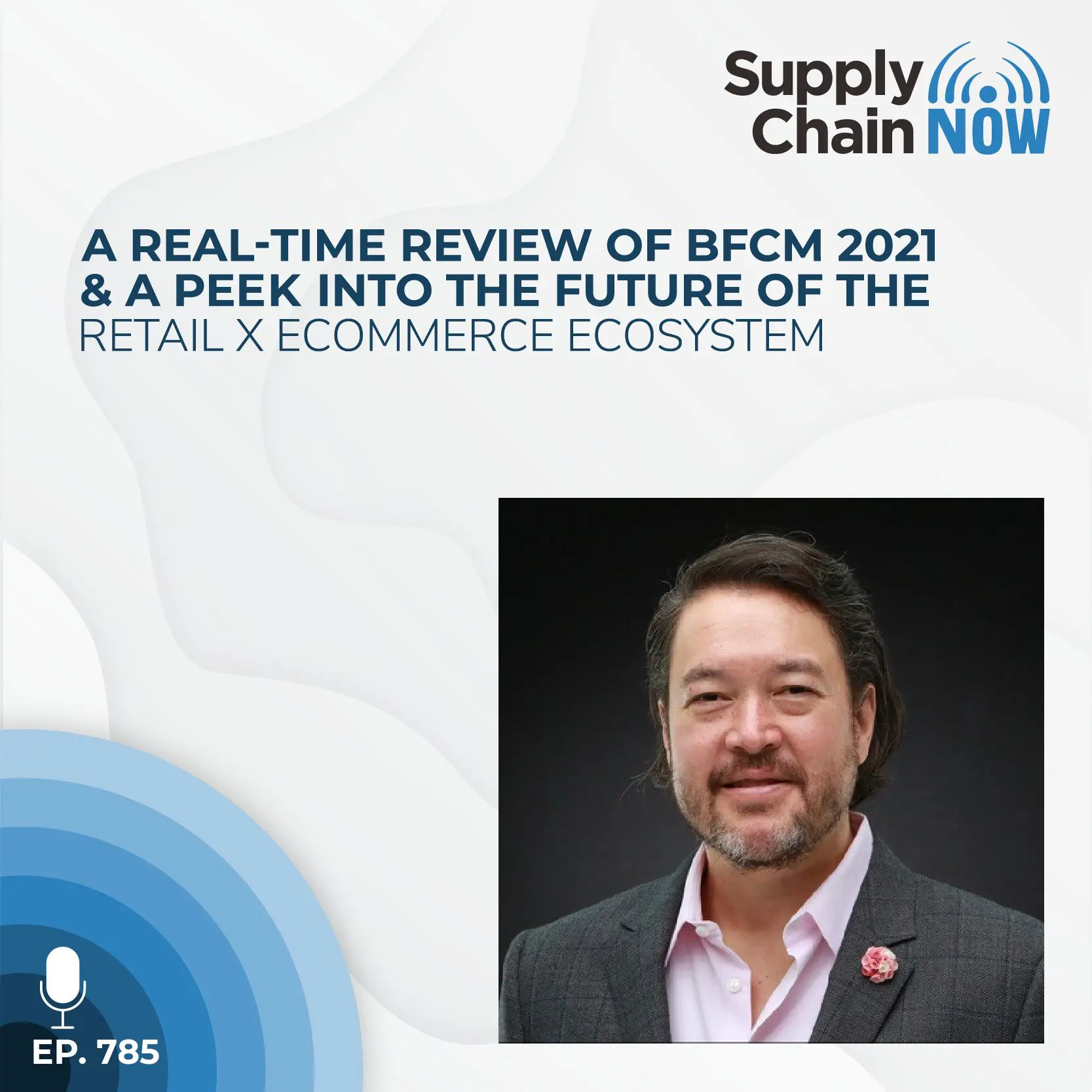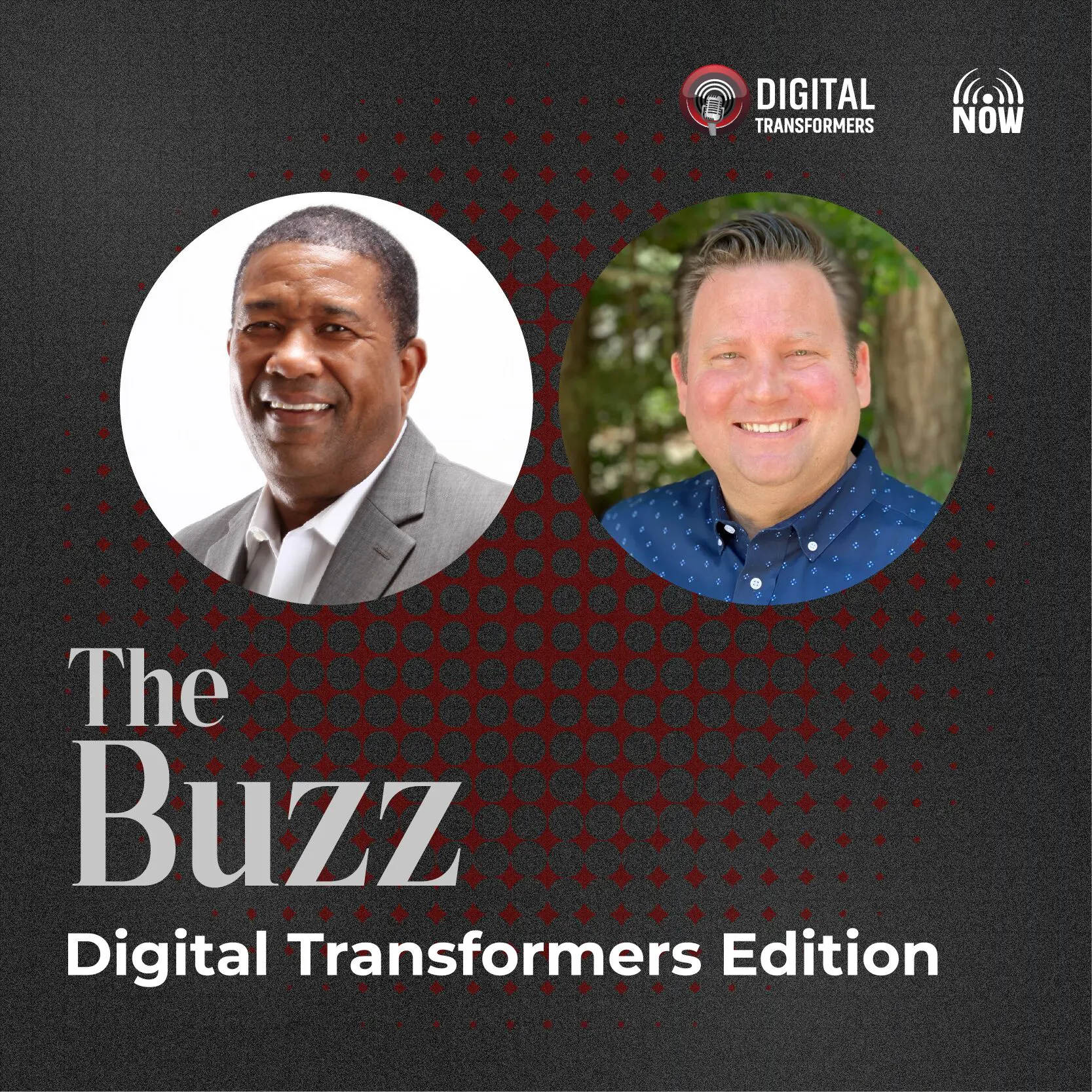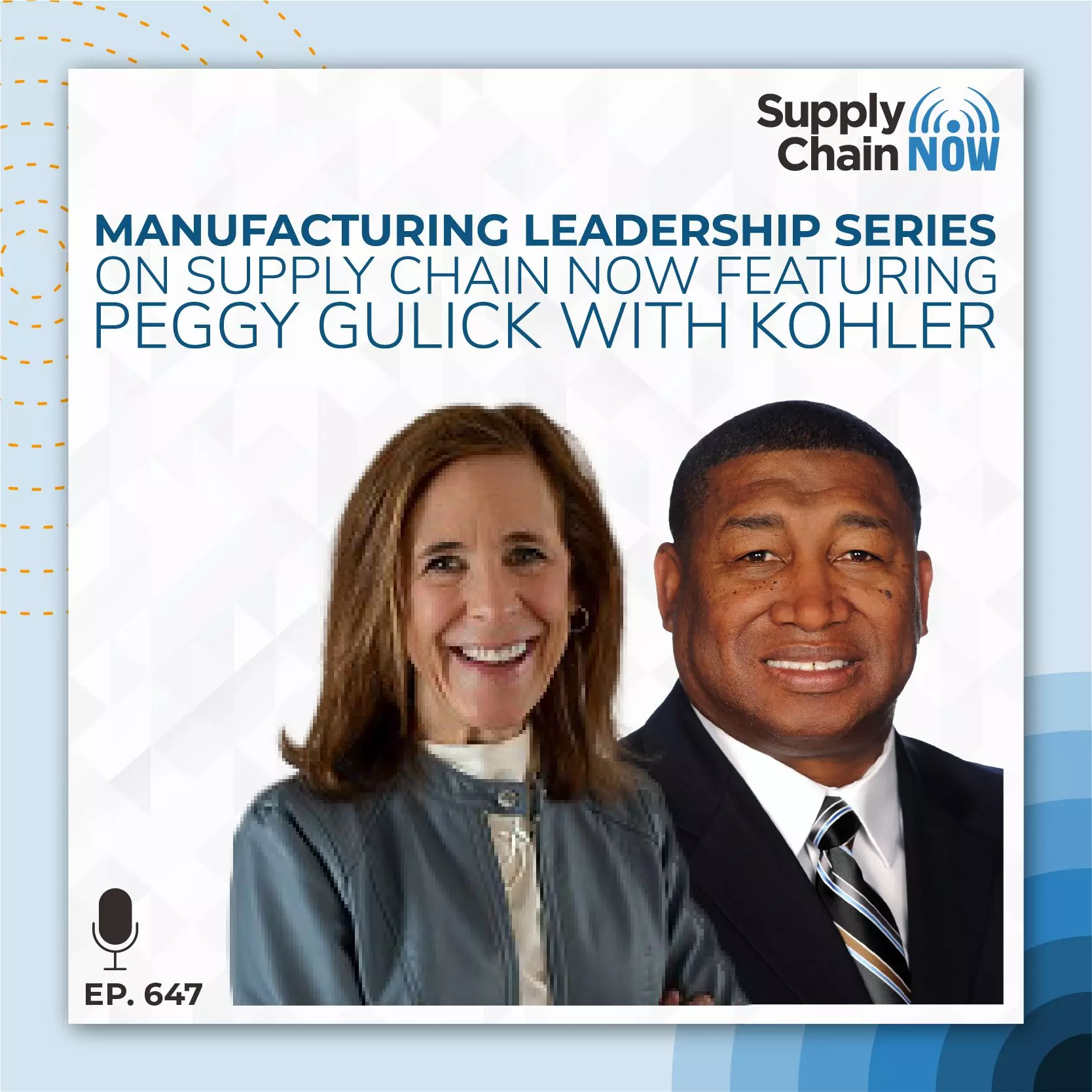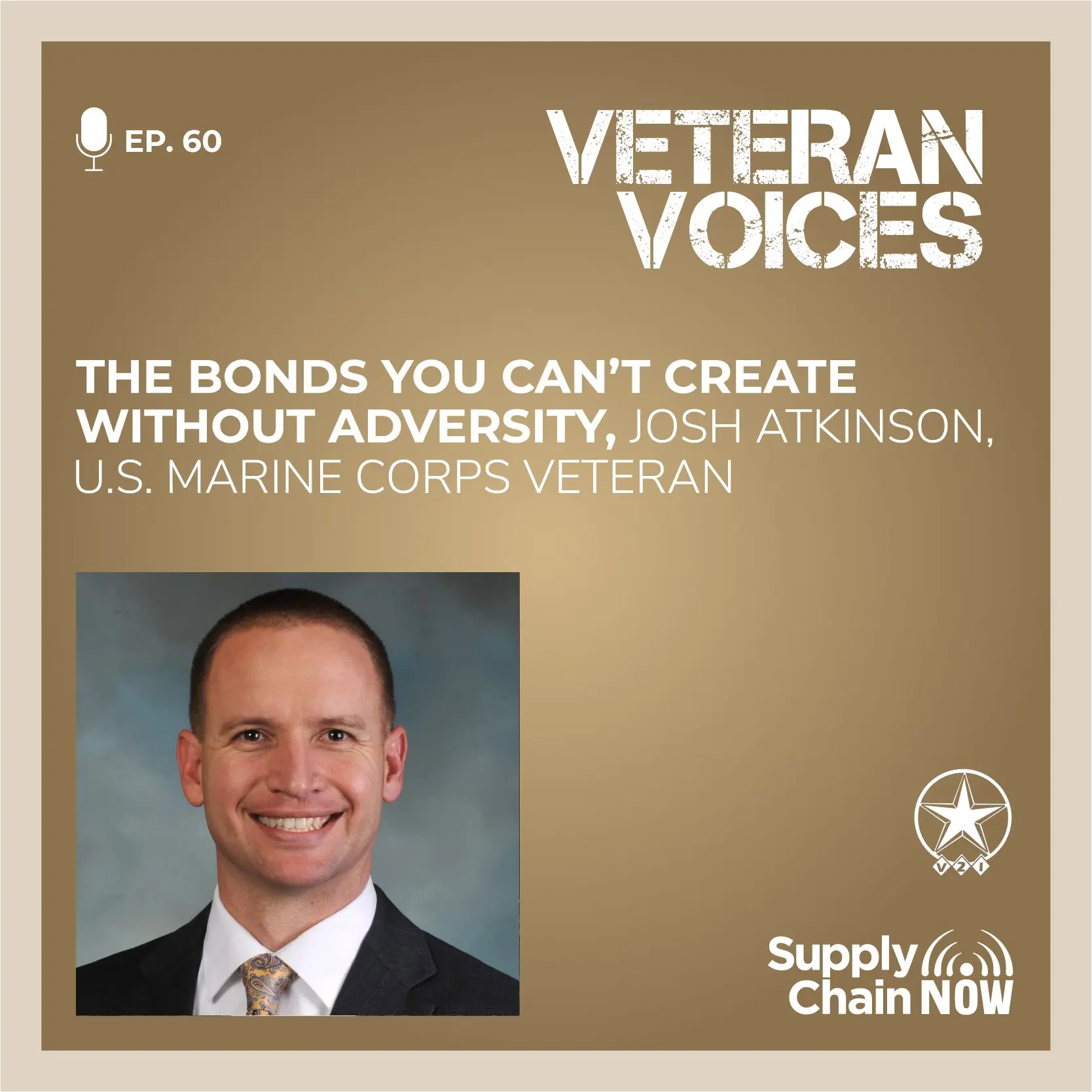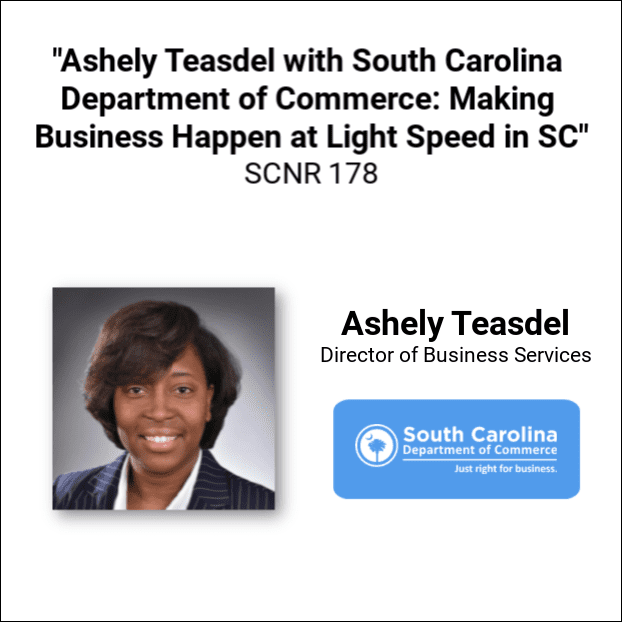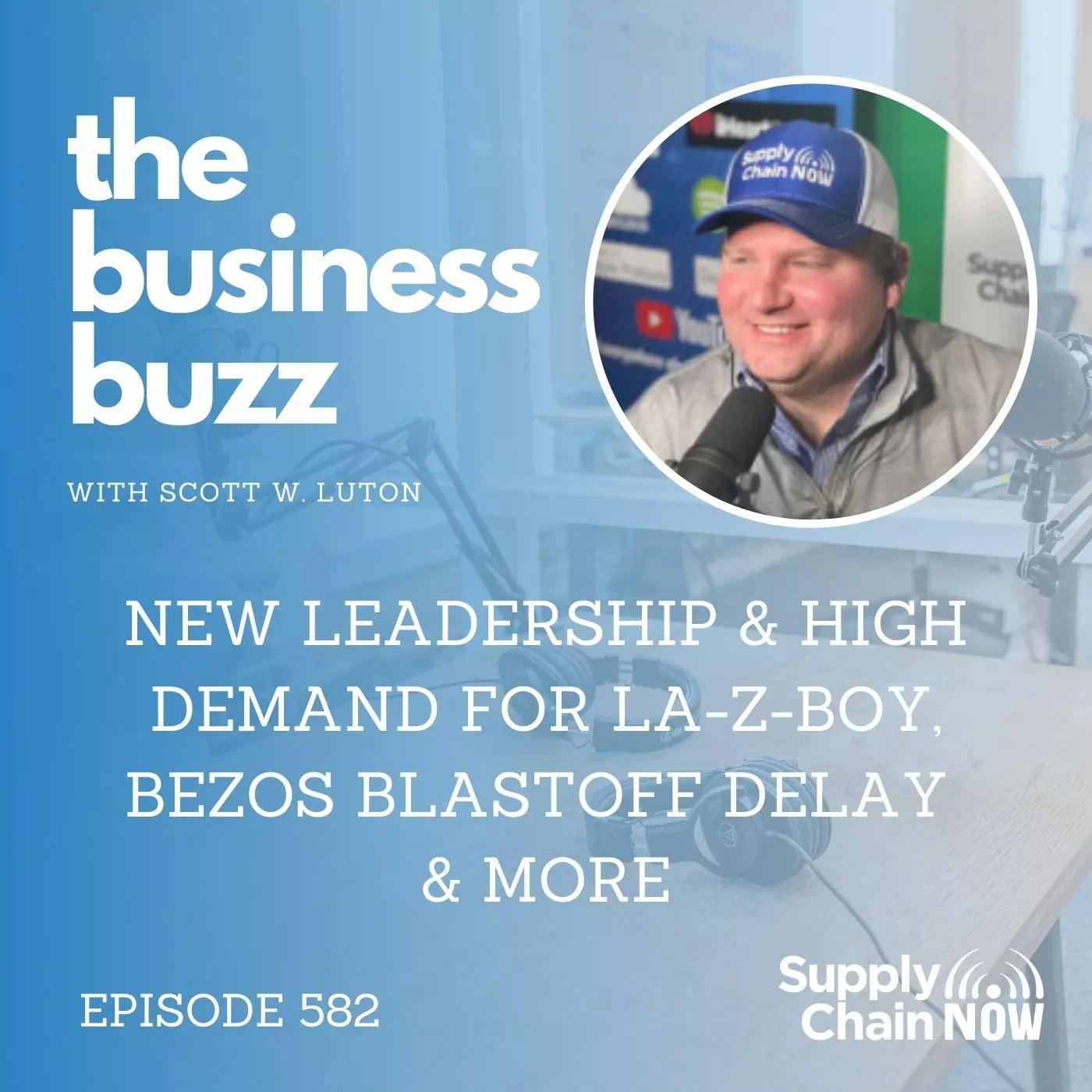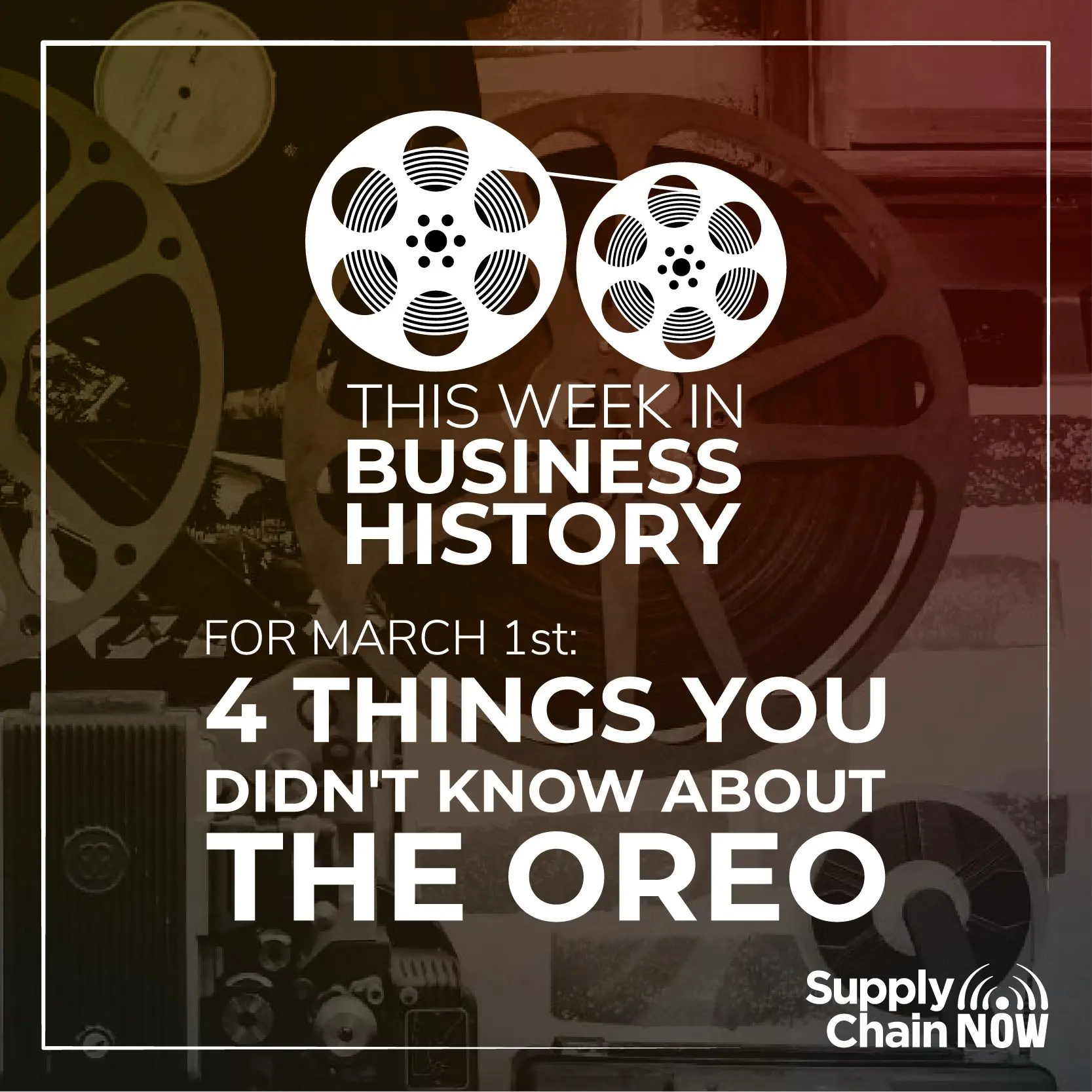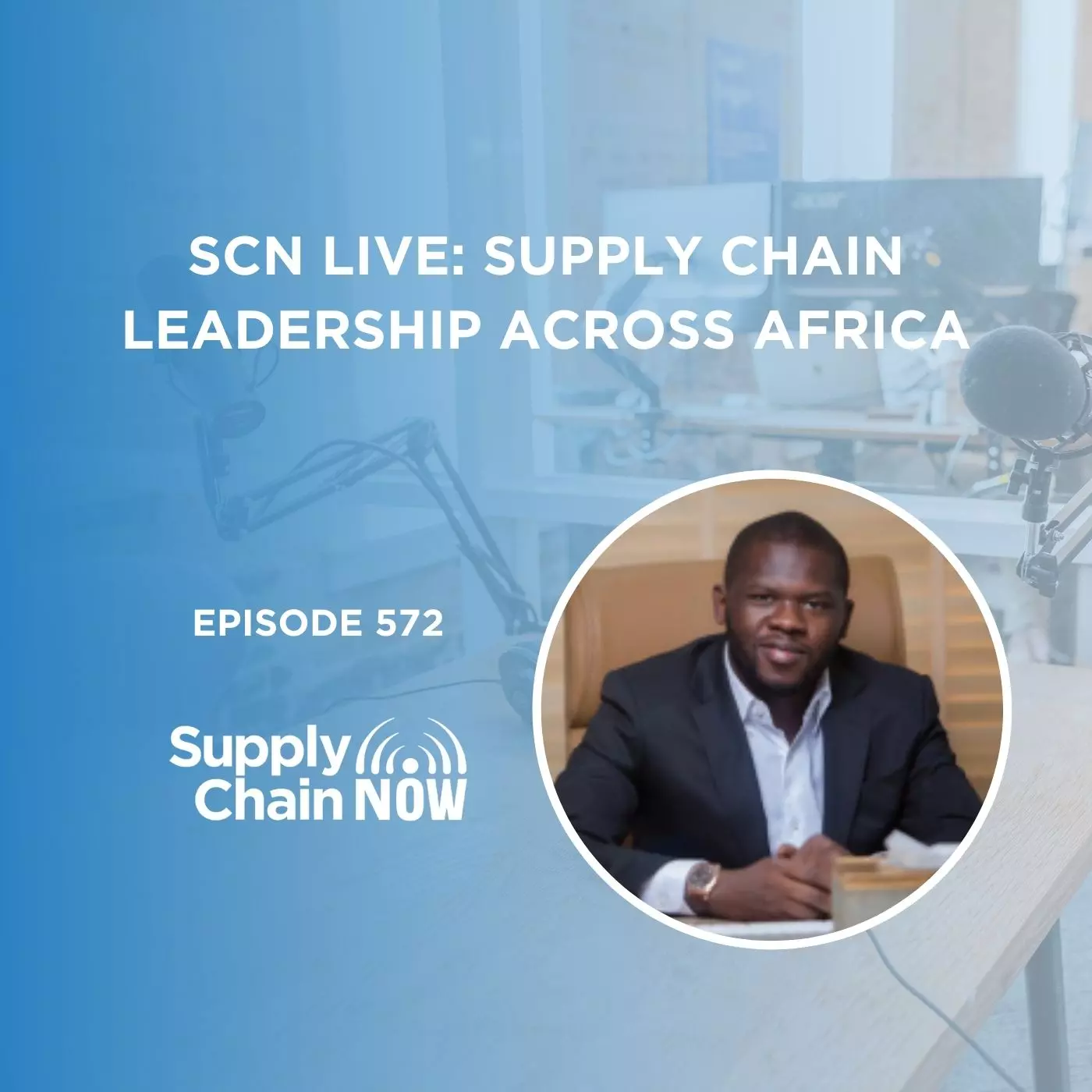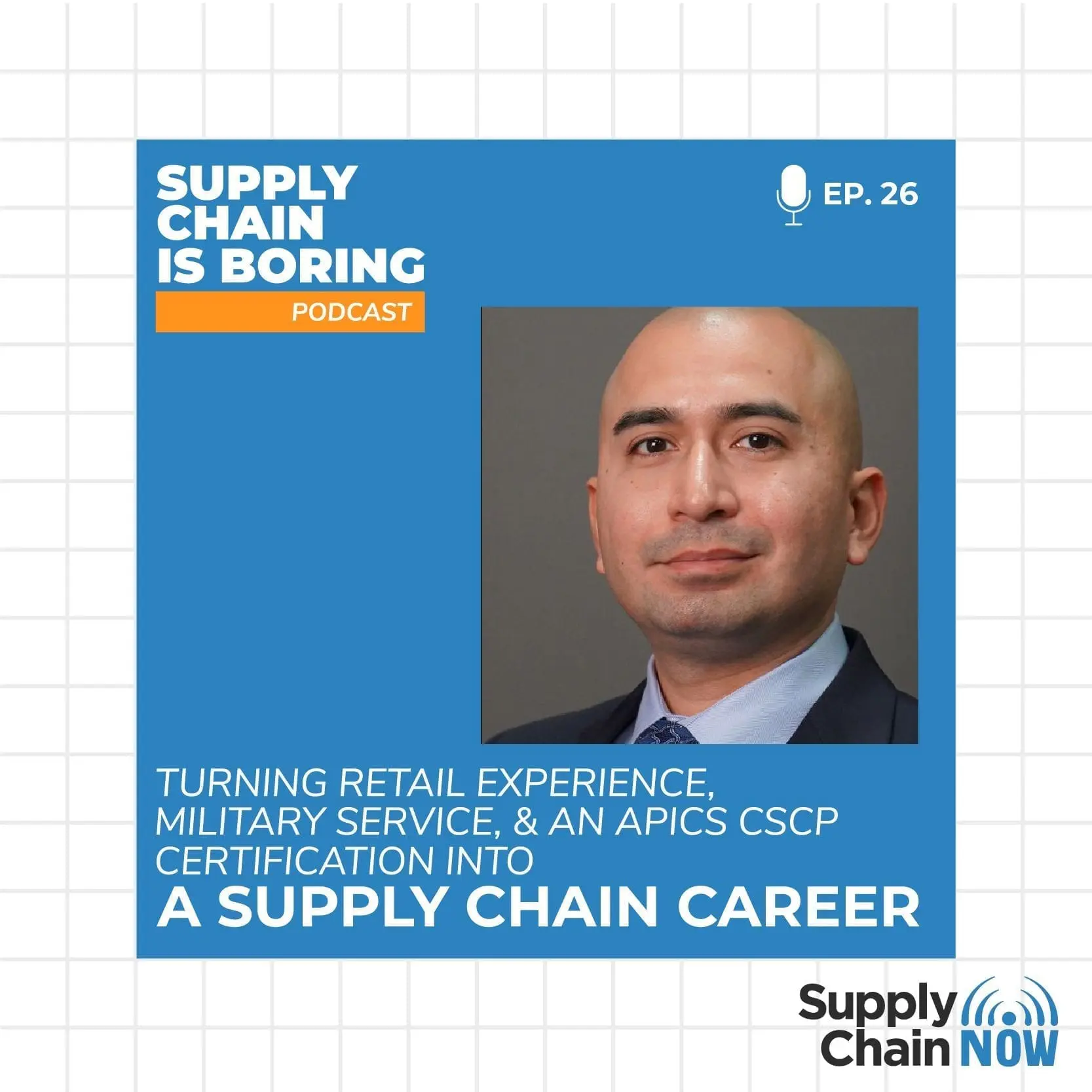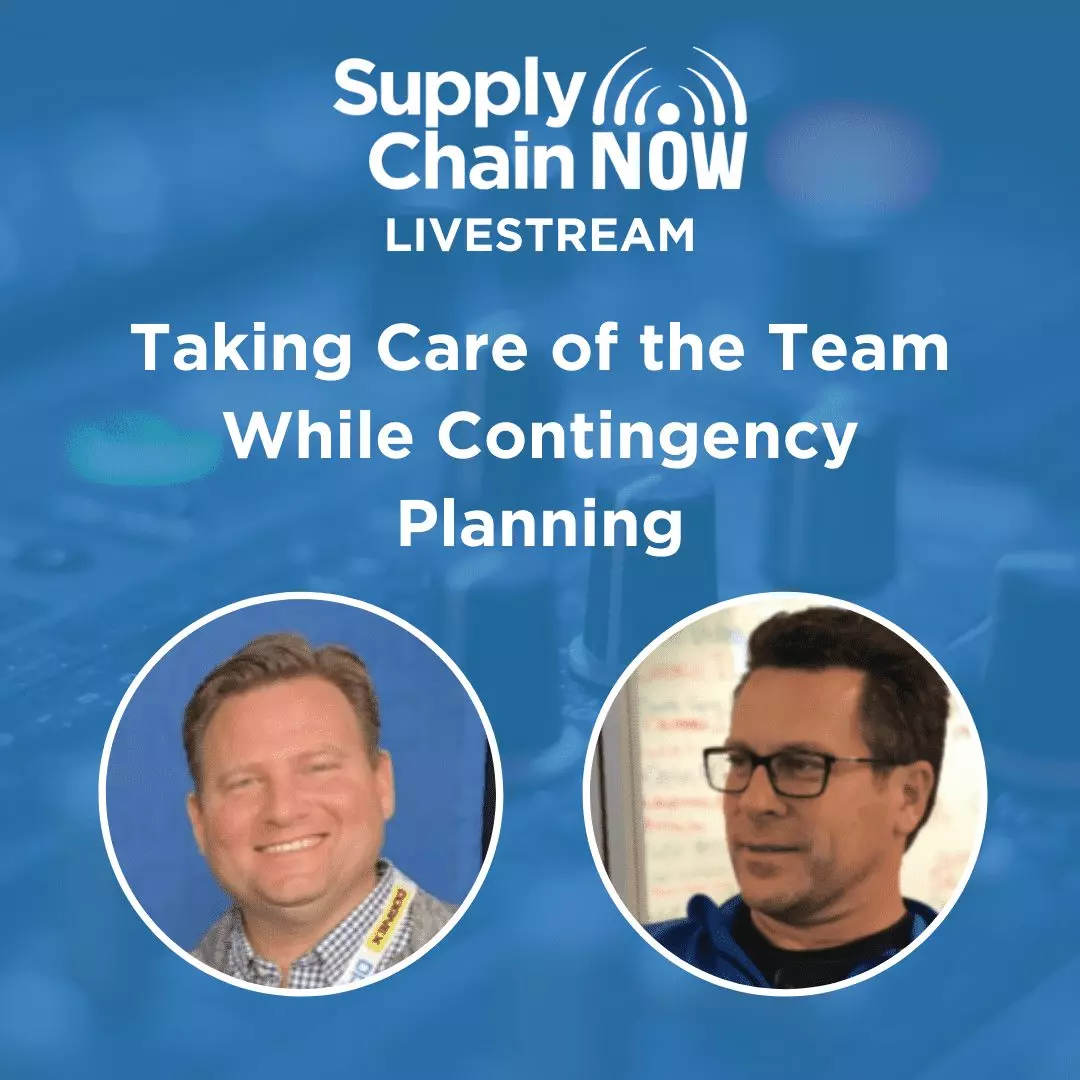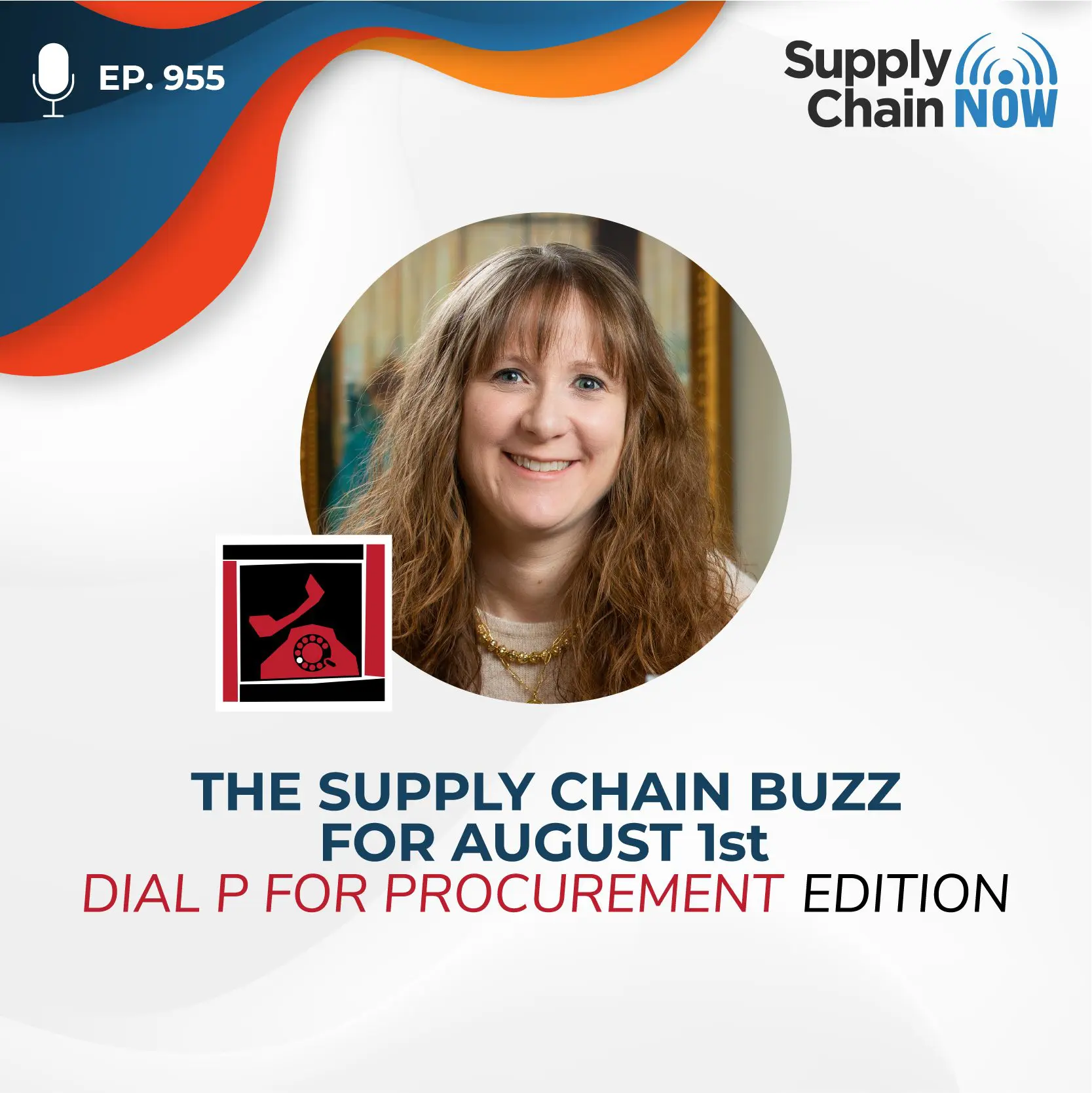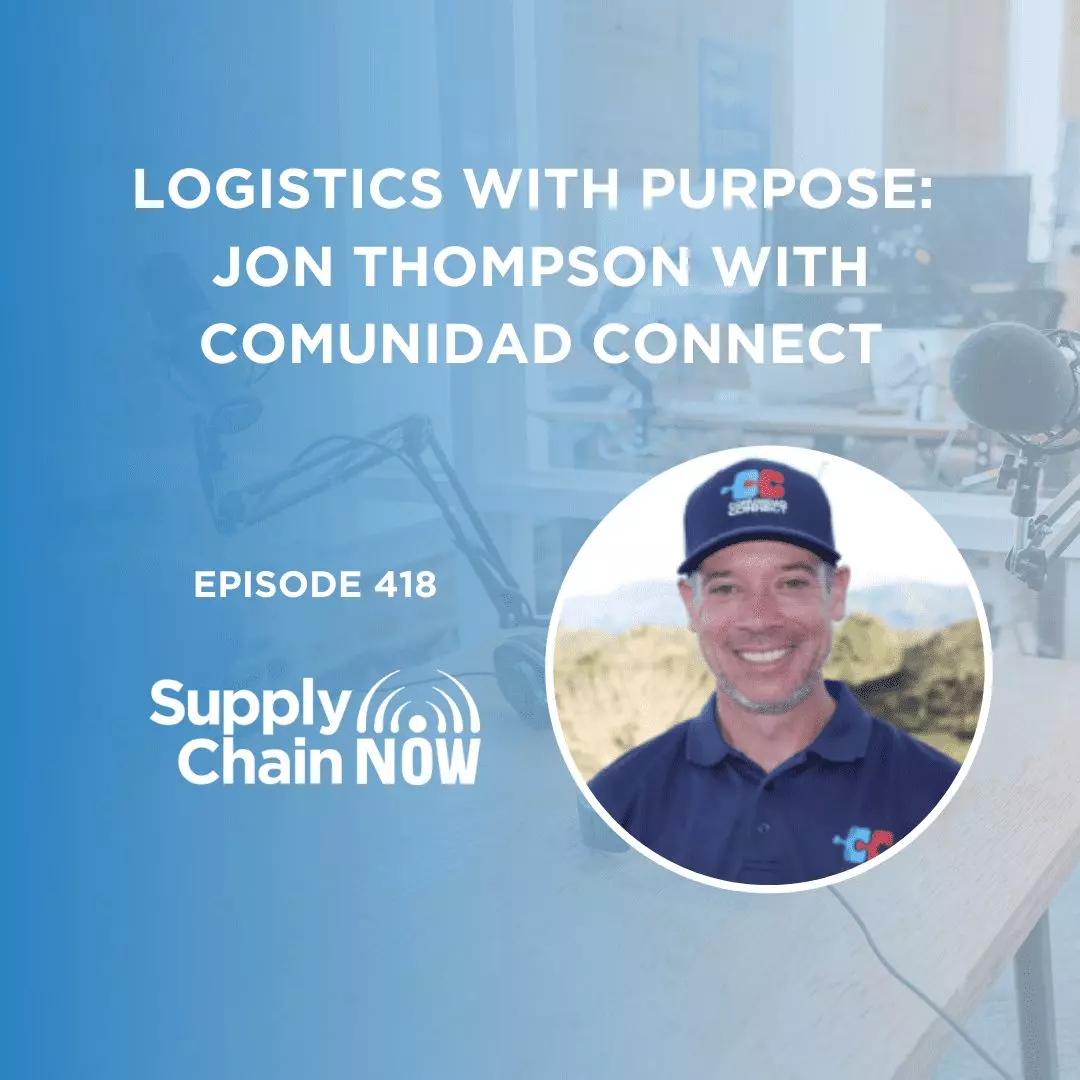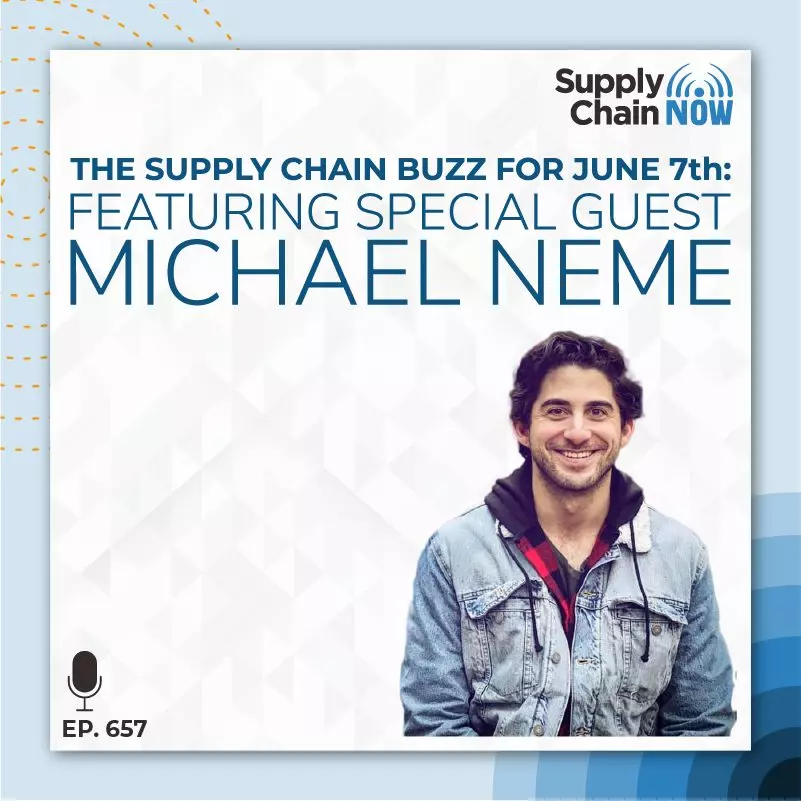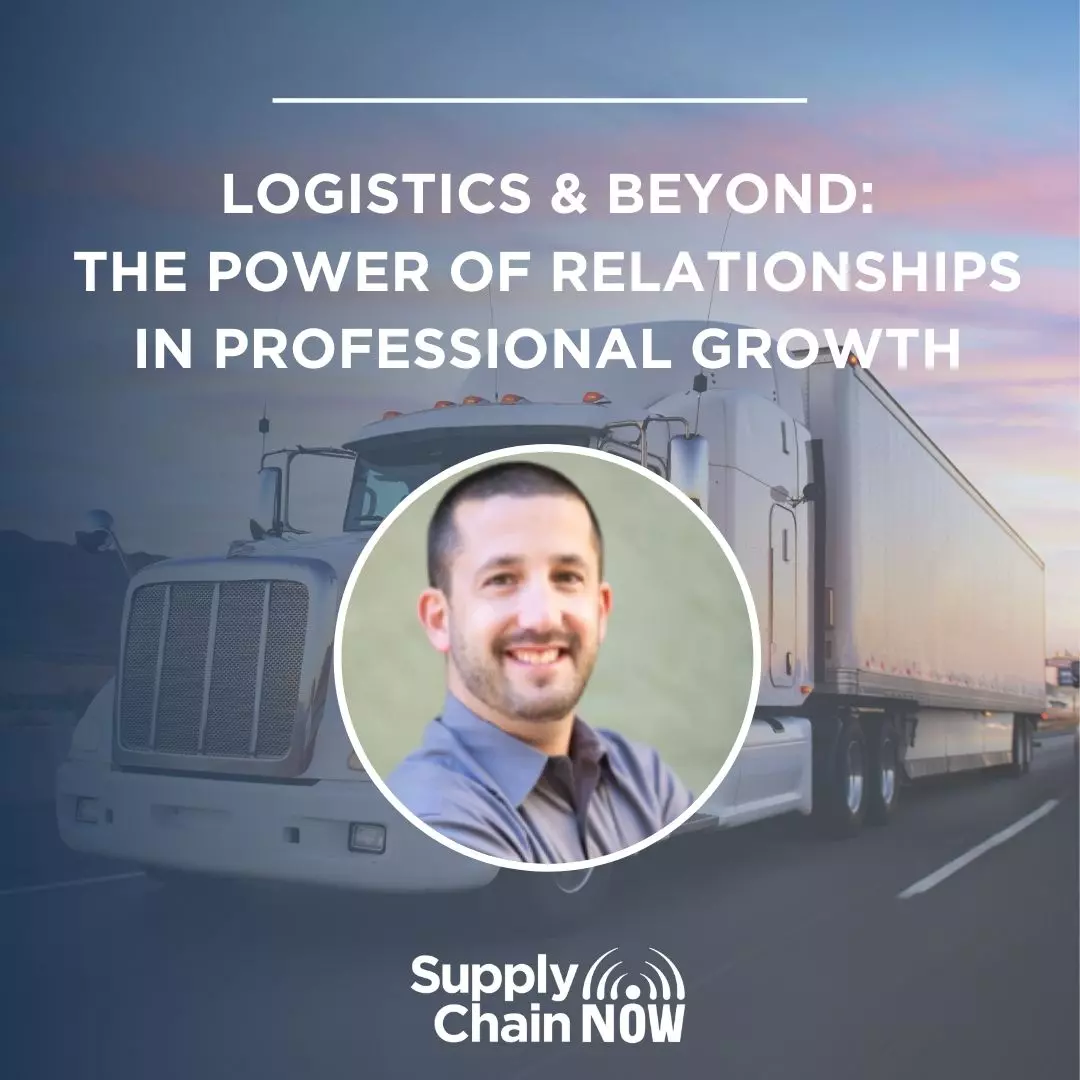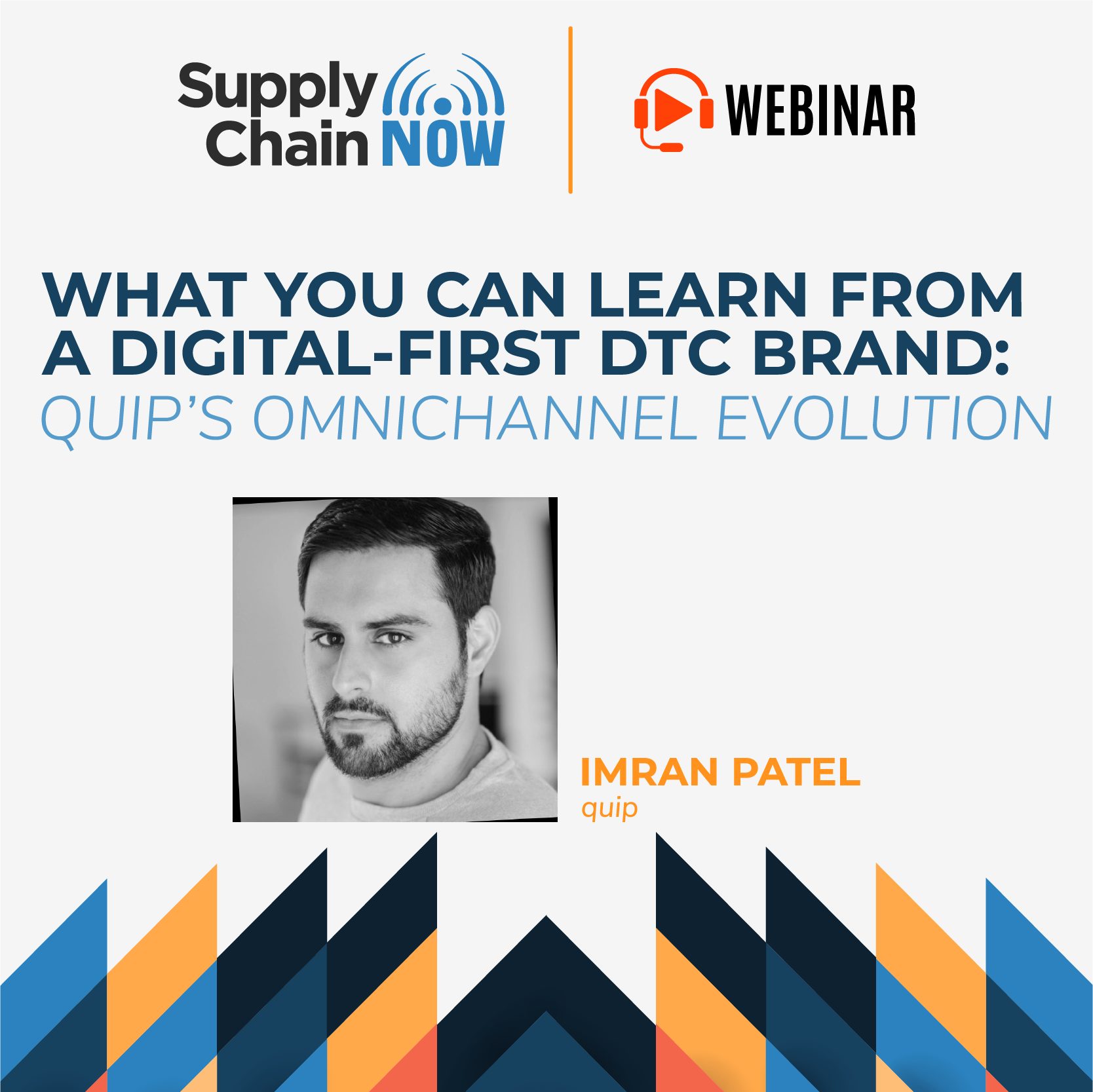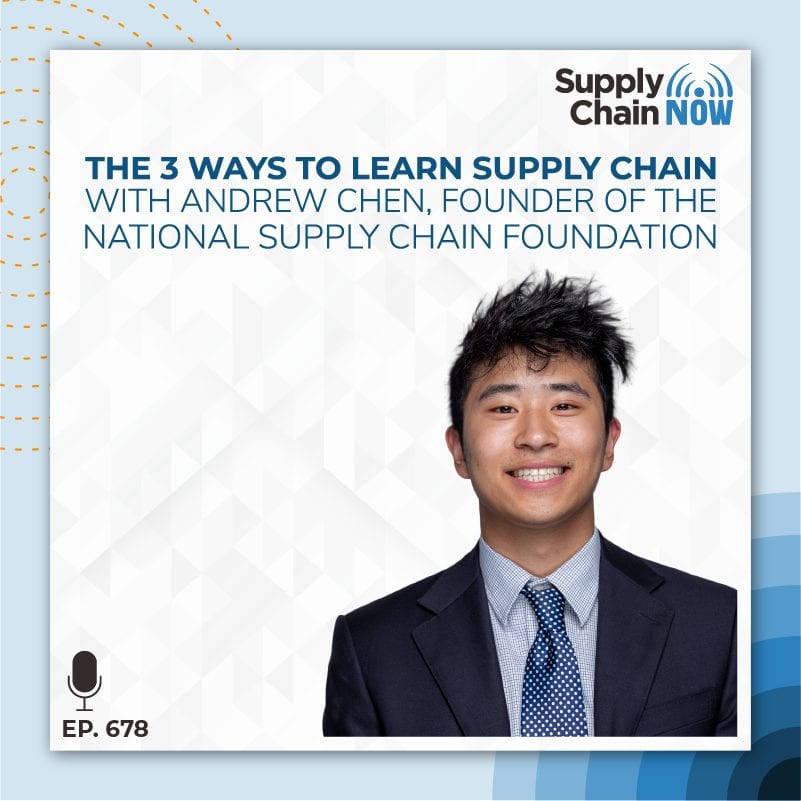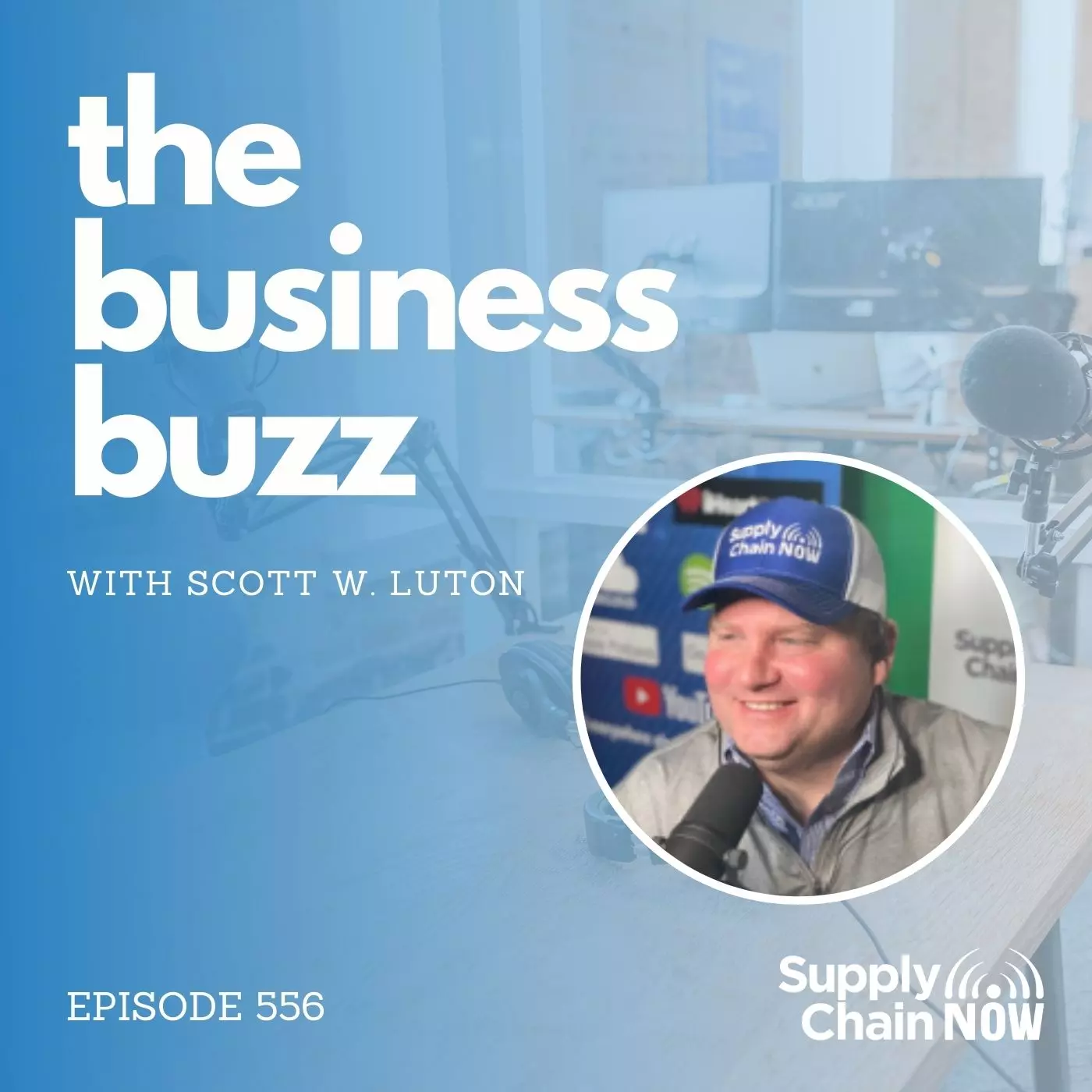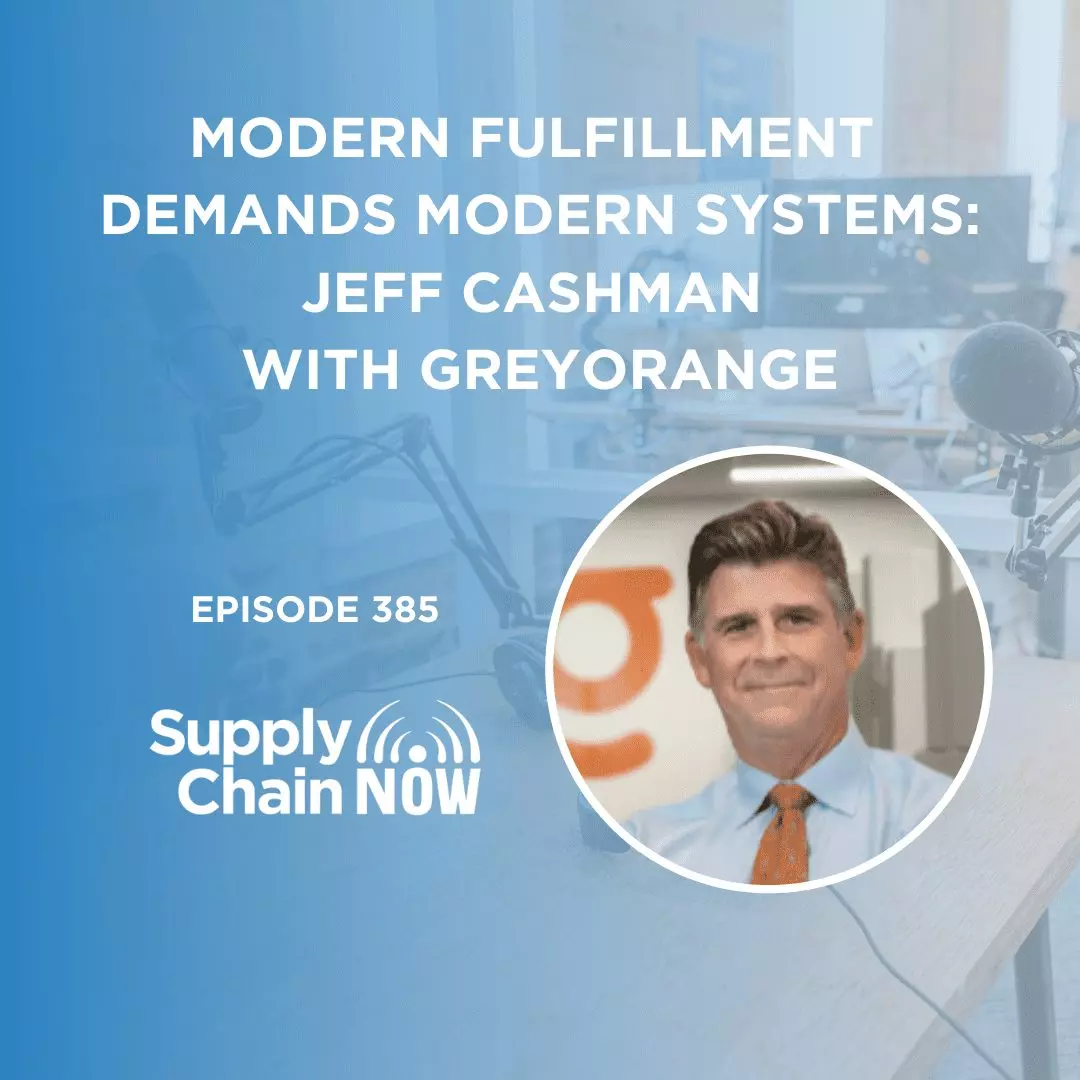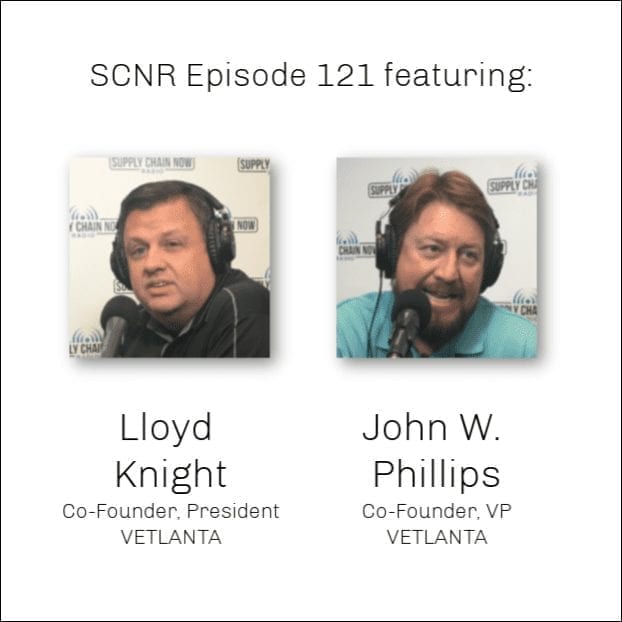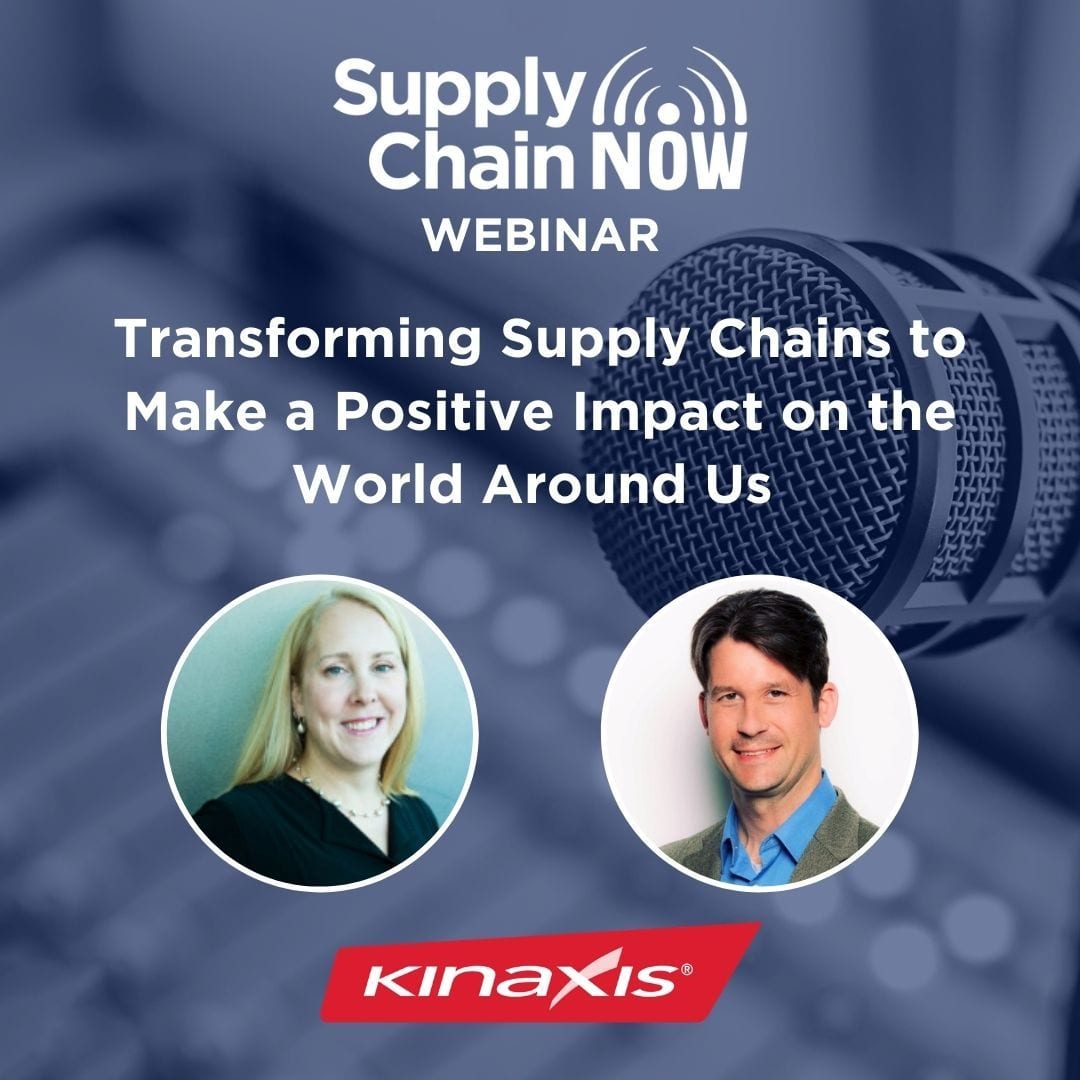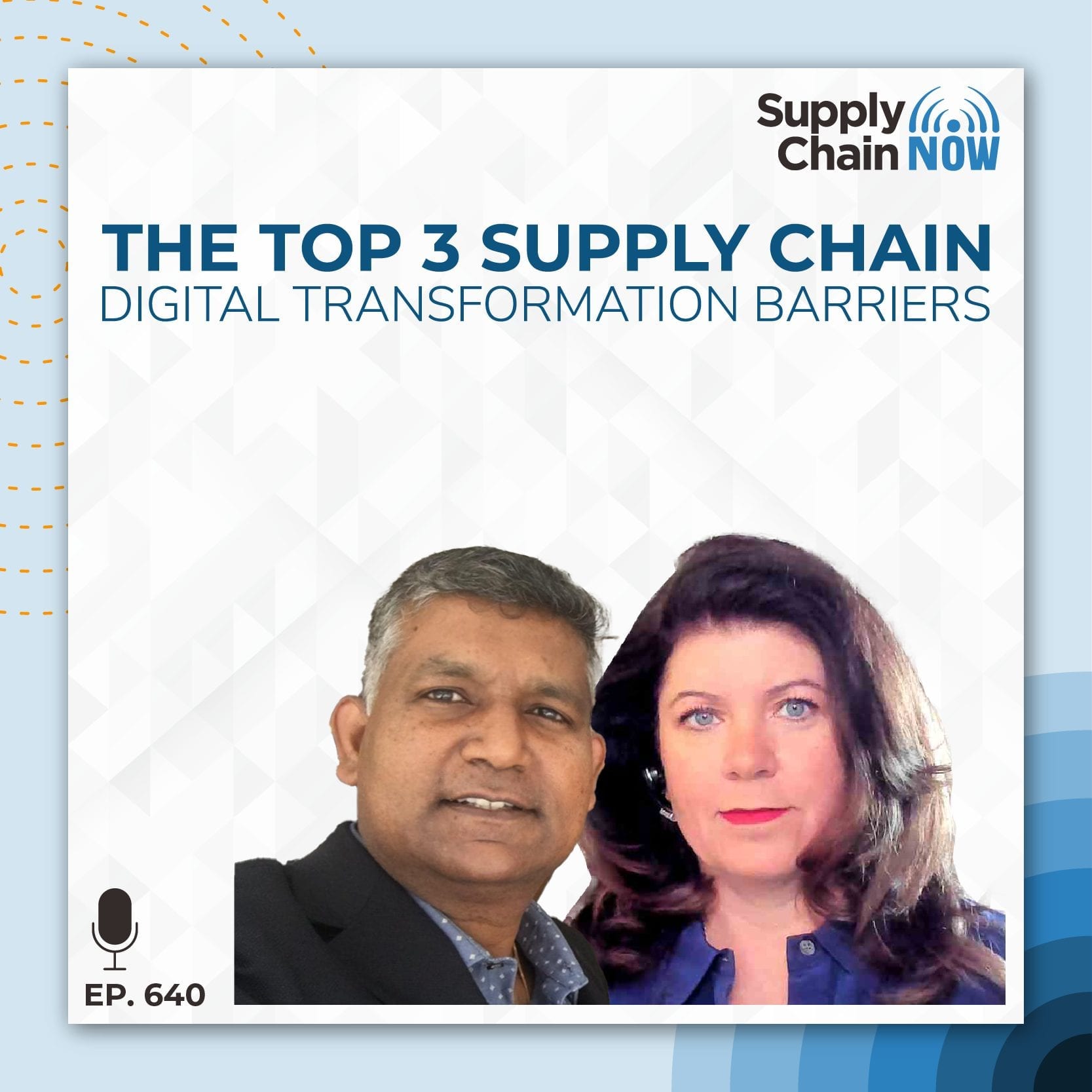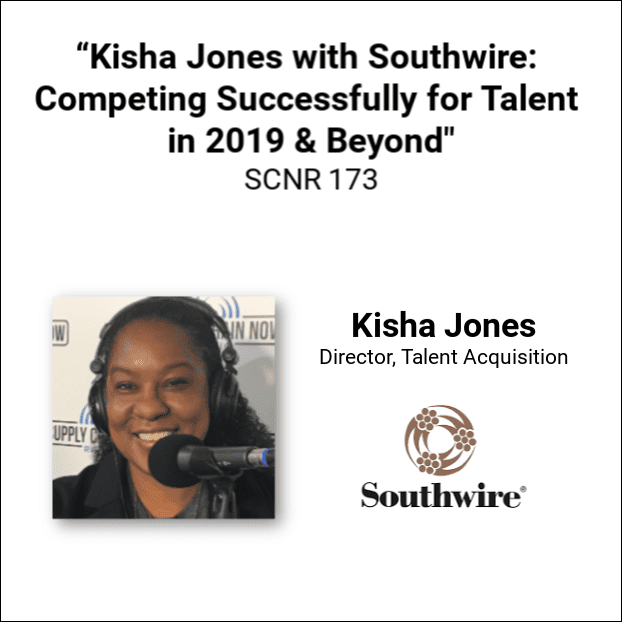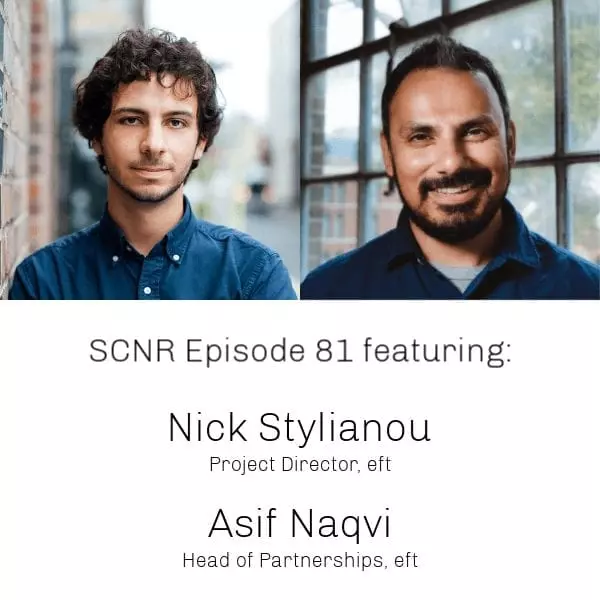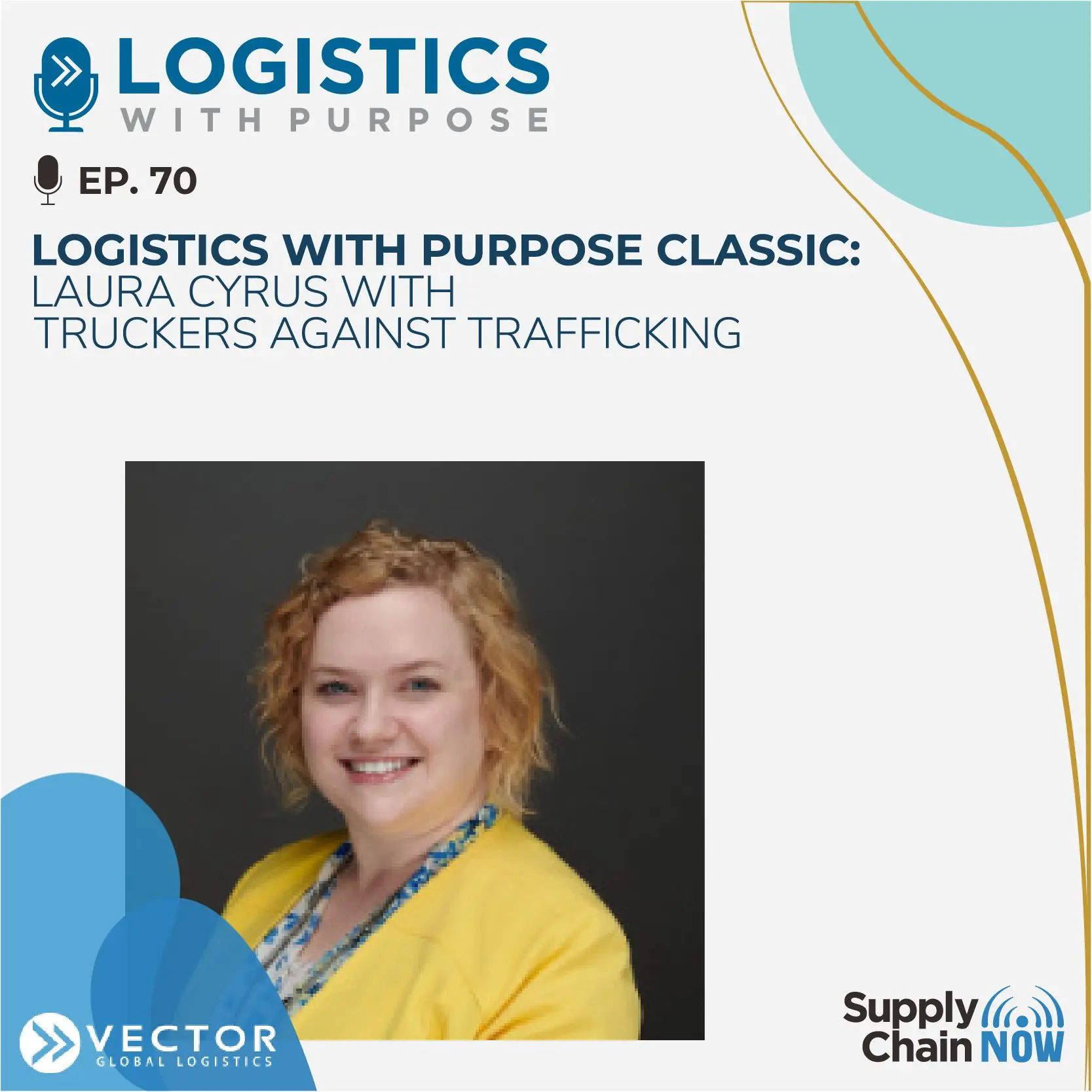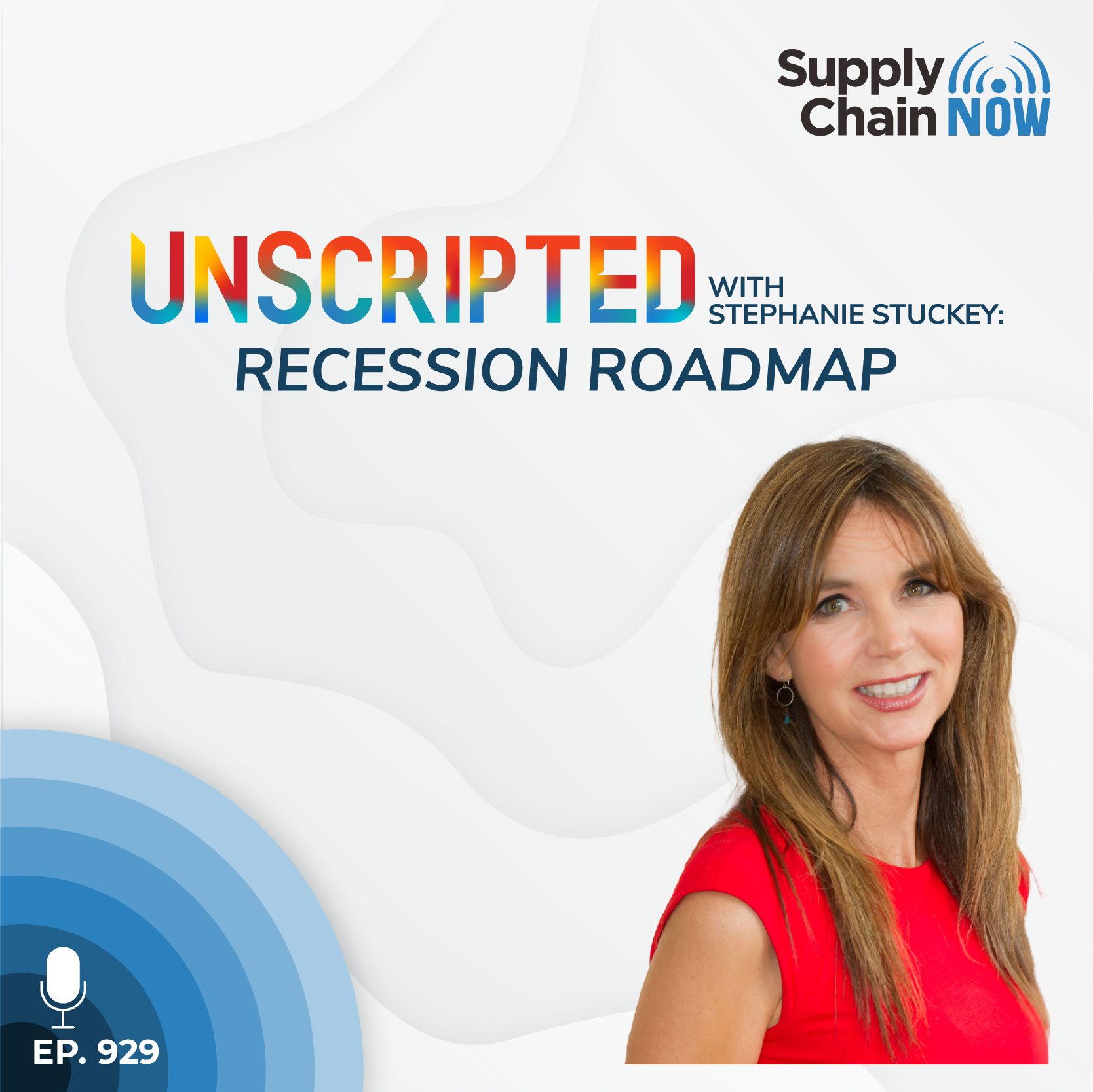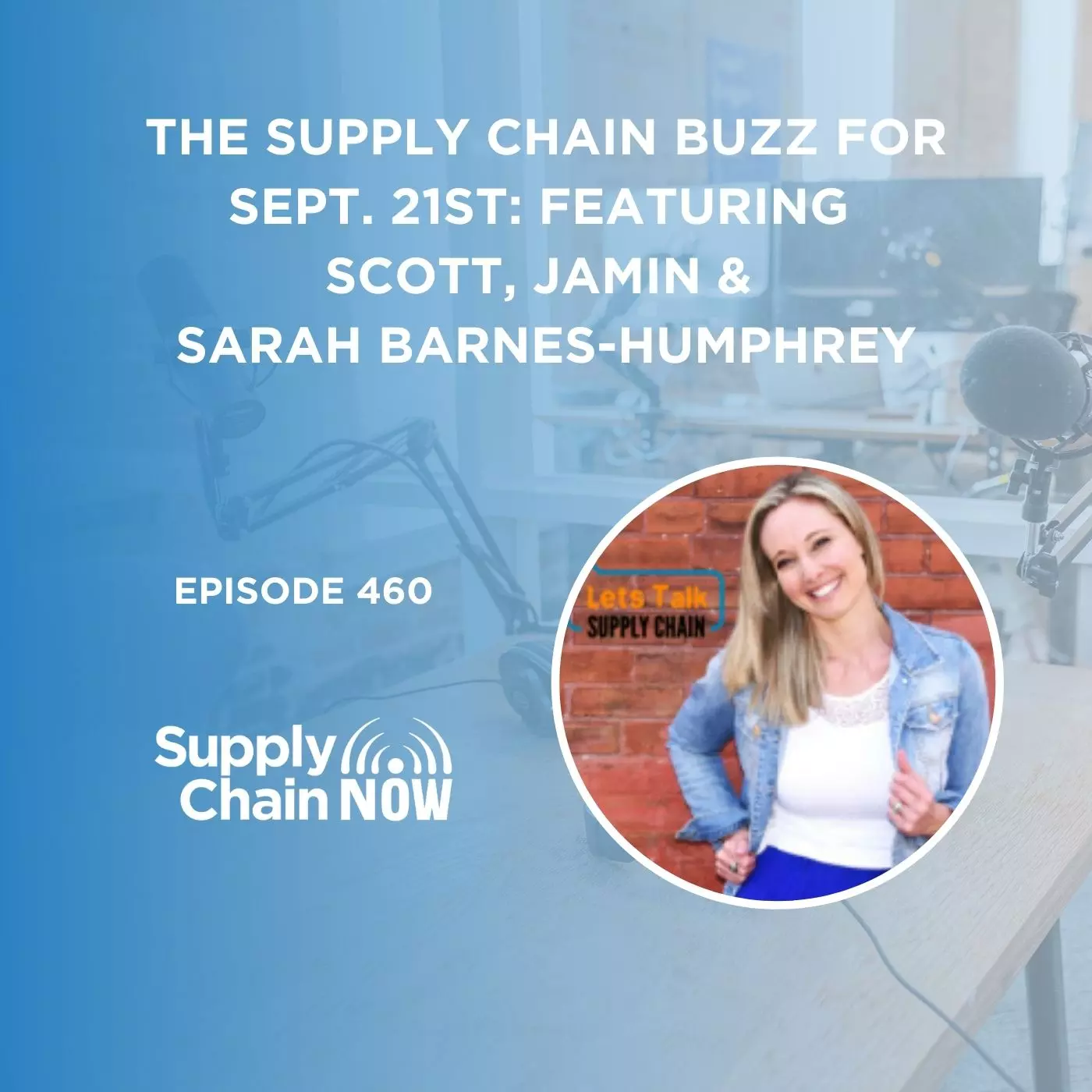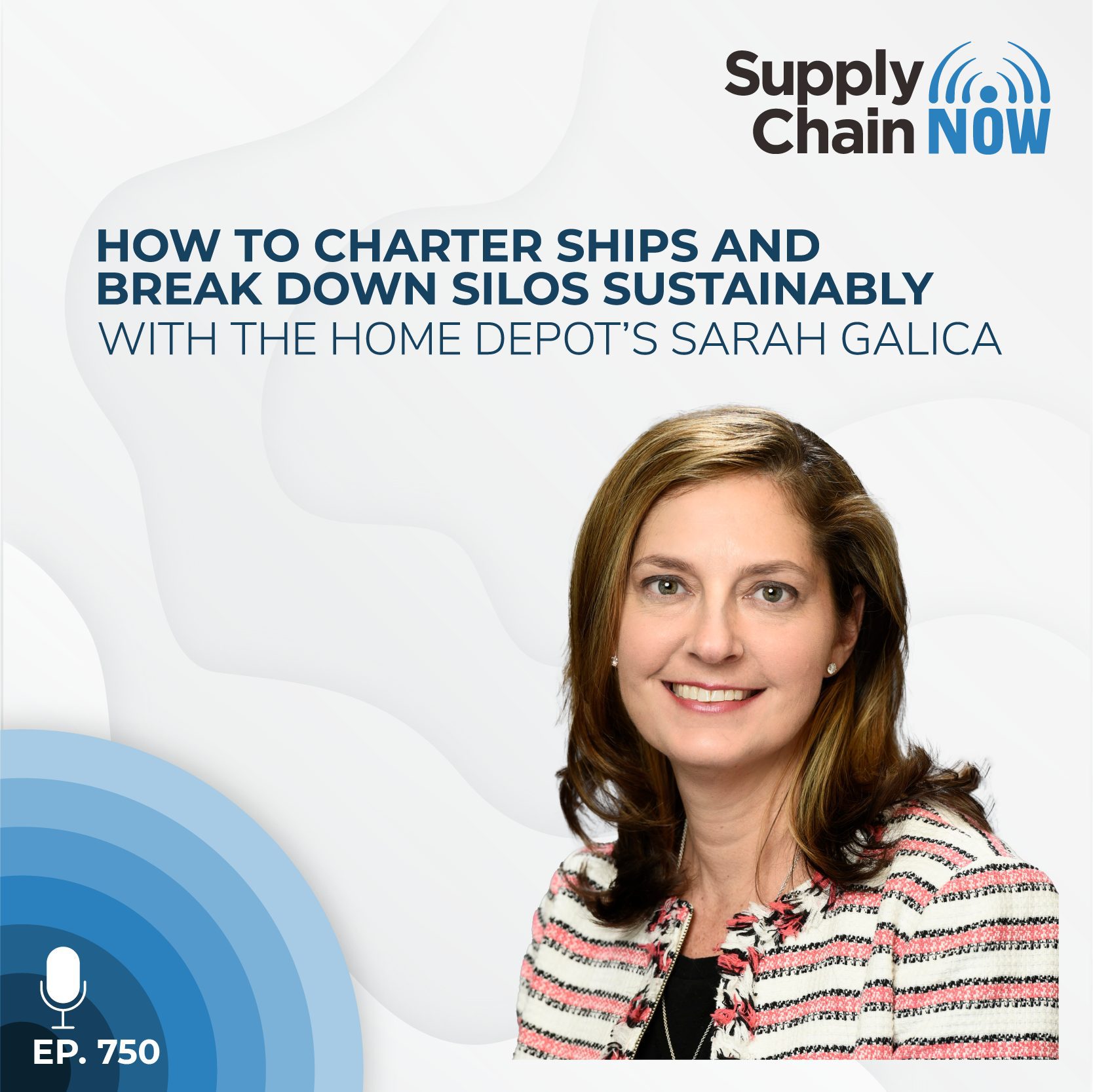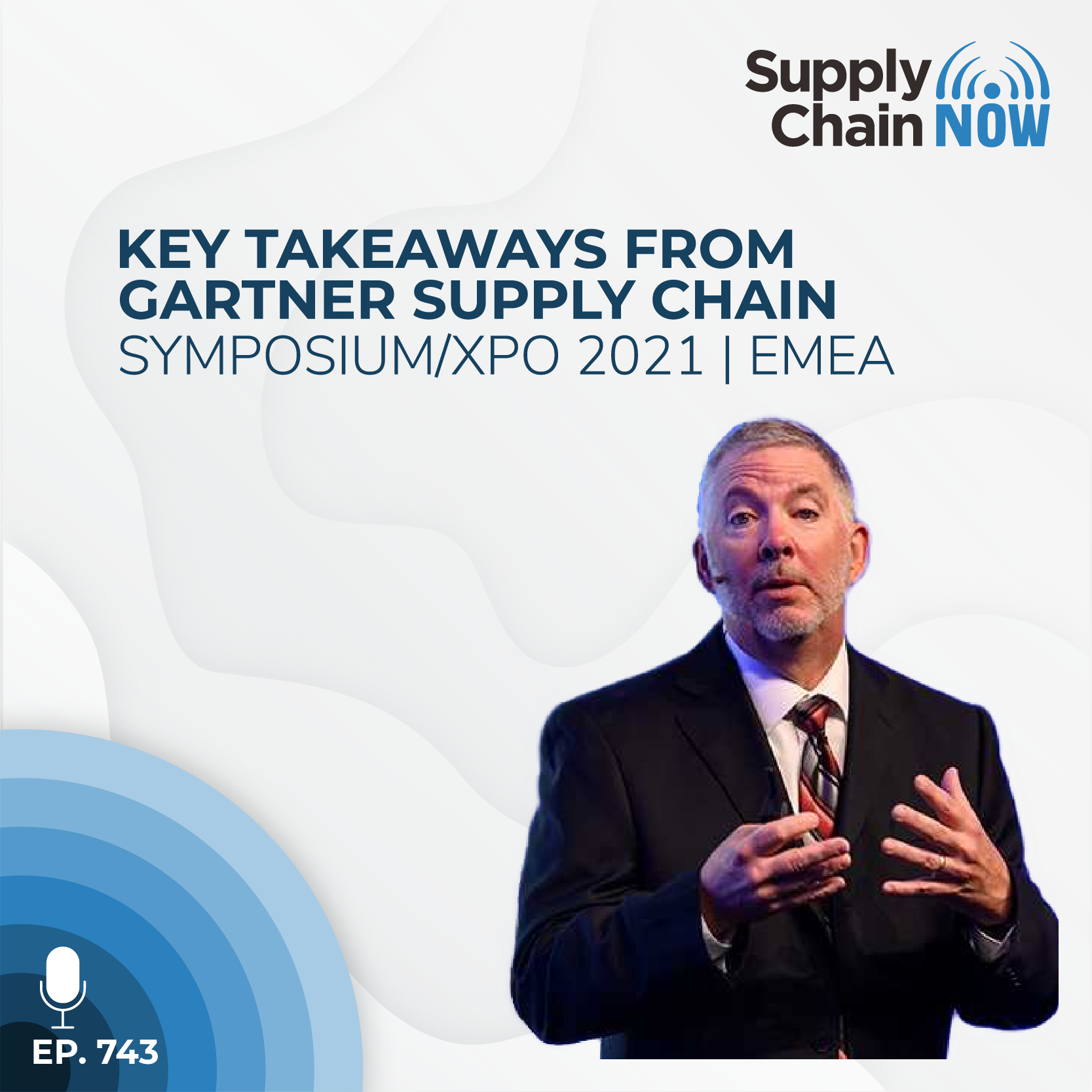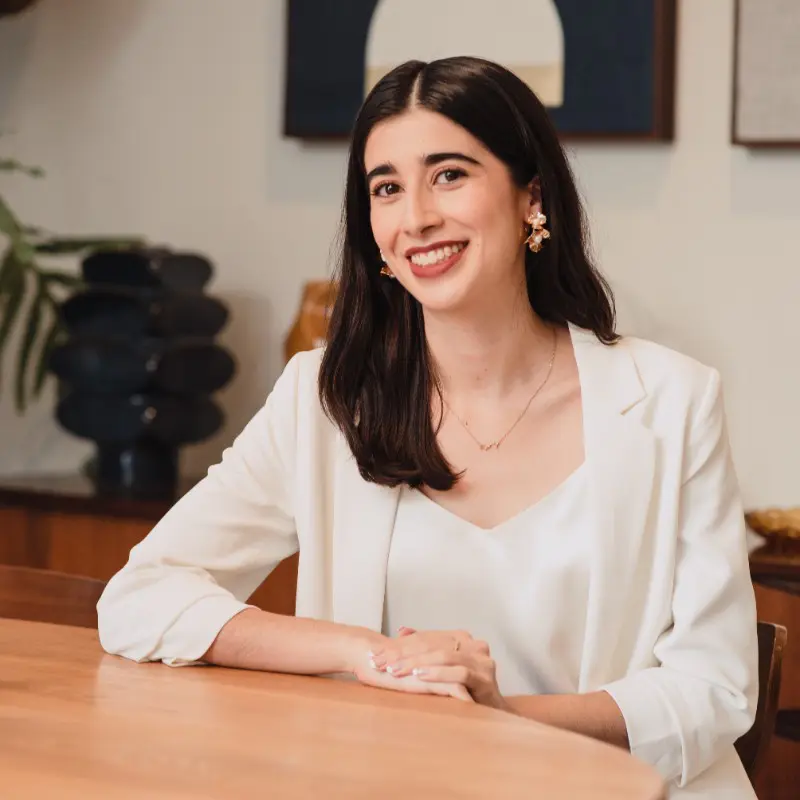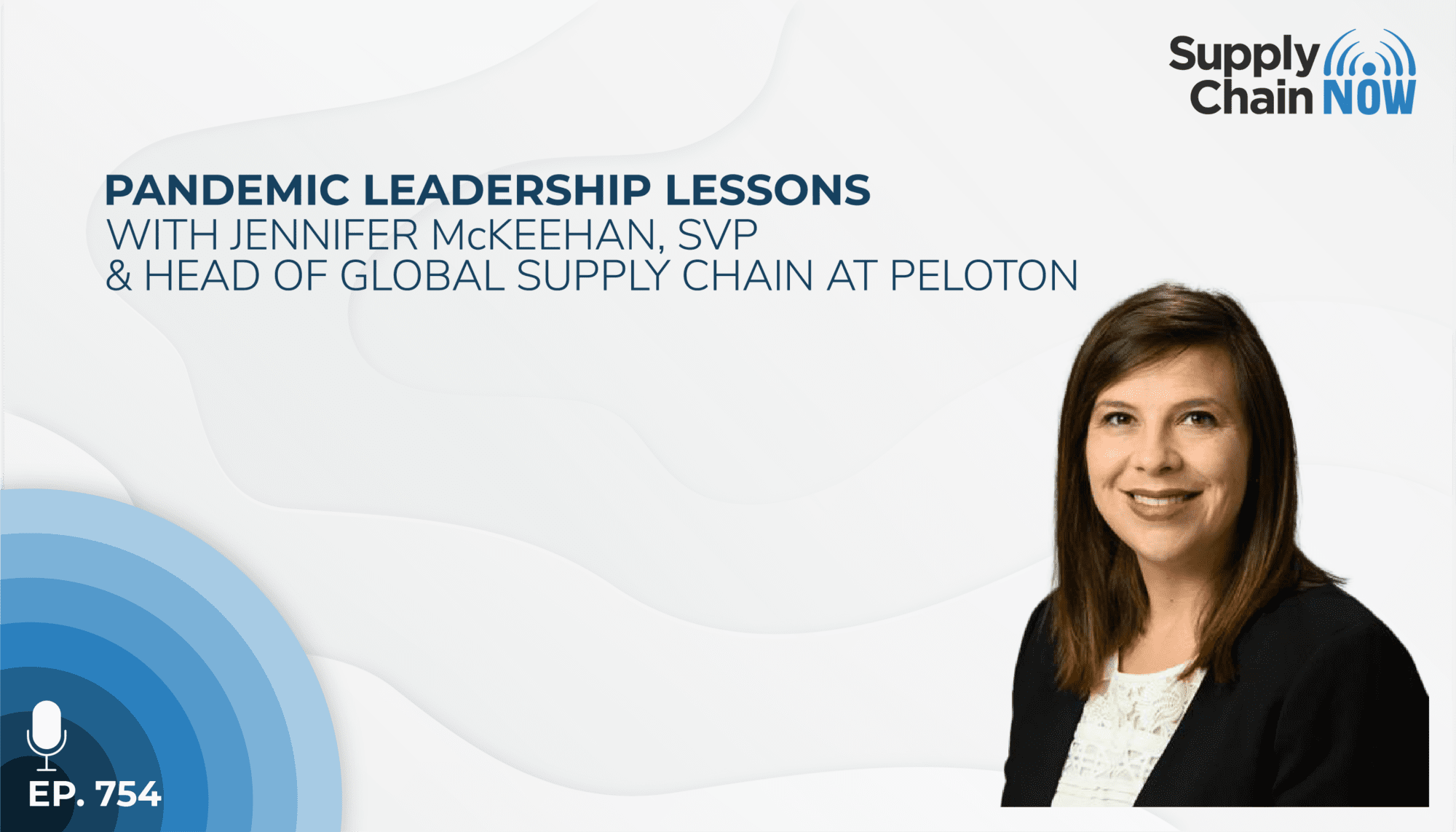
Always raise your hand for the job that nobody else wants; it's an opportunity to make a mark and make it your own and create a reputation and brand for yourself.
Jennifer McKeehan, Head of Global Supply Chain, Peloton
Episode Summary
Many companies were affected by the pandemic, but none were impacted as positively as Peloton. With everyone stuck in their homes overnight, the Peloton fitness community became a healthy lifeline to many, even though they were early in their own growth journey. And while their digital content is easily streamable via a number of devices, there still had to be an effective physical supply chain to get bikes and treads into consumers’ homes.
Jennifer McKeehan is Peloton’s Head of Global Supply Chain. She has more than 15 years’ experience in retail e-commerce supply chain operations and has been featured in Atlanta Business Journal’s 40 under 40 program as well as Georgia Tech’s first 40 under 40 program.
In this interview, Jennifer shares her journey and enthusiasm with Scott Luton and special guest host Allison Giddens, President of Win-Tech:
– The importance of embracing and identifying with the corporate culture of any company where you hope to be successful
– Why being vertically integrated has been both a blessing and a curse for Peloton as they try to scale their business and deliver against individual member promises at the same time
– How the hybrid work environment is allowing the best leaders to shine by continuing to build strong, meaningful relationships – even at a distance
Episode Transcript
Intro/Outro (00:03):
Welcome to Supply Chain Now, the voice of global supply chain. Supply Chain Now focuses on the best in the business for our worldwide audience, the people, the technologies, the best practices, and today’s critical issues, the challenges and opportunities. Stay tuned to hear from those making global business happen right here on Supply Chain Now.
Scott Luton (00:32):
Hey, good morning, everybody. Scott Luton and Allison Giddens here with you on Supply Chain Now. Welcome to today’s episode. Allison, how are you doing?
Allison Giddens (00:39):
I am good.
Scott Luton (00:41):
Well, and you’re also succinct today. We got a great, great episode lined up ready to go. And I’m excited about it. How about you?
Allison Giddens (00:50):
I am. I am. I’m totally pumped because this person is one of my dearest friends in the Cobb chamber environment and one of the people that I have looked up to for a while. And, it wasn’t until a couple of years ago that I really got to know her, like actually personally, and she’s a rock star, so I’m excited.
Scott Luton (01:08):
We are too. Appreciate your facilitation. Always, always, always a pleasure hosting these conversations with you. Now today, as you’ve kind of led on, we’re going to chat with a global supply chain leader that has helped an iconic brand leverage the best in technology, hardware, production, and a sense of community to help folks around the world improve their health and fitness and have a heck of a time doing it. So, on that note, let me introduce our guest. You ready, Allison?
Allison Giddens (01:32):
Let’s do this.
Scott Luton (01:33):
Okay. We had to work hard, had to go through agents to guests book today. Our featured guest brings more than 15 years of successful experience in retail, e-commerce, supply chain operations to the table. She’s been featured on Atlanta Business Journal’s 40 Under 40 Program as well as Georgia Tech’s first 40 Under 40 Program. Our guest has wowed audiences at respected organizations, such as the Wall Street Journal and the Harvard Business School. She’s also a member of the leadership Atlanta Class of 2020. And all of that is just scraping the tip of the iceberg. Let’s welcome in Jennifer McKeehan, Head of global supply chain with Peloton. Jennifer, how you doing?
Jennifer McKeehan (02:09):
Hey guys, how are you?
Scott Luton (02:11):
Doing wonderful. You know, Allison, I just realized I did not ask Jennifer on the front end if I pronounced her last name right. Did we get it?
Jennifer McKeehan (02:19):
You’re spot on.
Scott Luton (02:20):
Okay.
Jennifer McKeehan (02:20):
You got it.
Scott Luton (02:21):
All right.
Jennifer McKeehan (02:21):
You nailed it.
Scott Luton (02:21):
All right. You know, growing up for me every first day of school, it was Mr. Luton, Mr. Luton, and it’s always Luton, like Luton, England, England, rather. But great to have you, Jennifer, as busy as you are, appreciate you spending some time with us.
Jennifer McKeehan (02:34):
No, I’m excited to spend the time today. Thanks.
Scott Luton (02:36):
Well, I’ll tell you, Allison, you had some wonderful words on the front end. So, I look forward to kind of learning more about that. But where are we starting with Jennifer here today?
Allison Giddens (02:46):
Well, I know a little bit here and there about Jennifer, maybe some of the stuff she doesn’t want me to bring up, but I would say we start with kind of getting the basics. Jennifer, can you tell us a little bit about who you are? Where’d you grow up? Tell us about your upbringing, things like that.
Jennifer McKeehan (03:01):
Yeah. I’ll keep you busy so you don’t tell any of the secret stories, Allison. I actually am a rare native of the Atlanta area. I grew up about an hour northeast in Lawrenceville, Georgia. I went to Central Gwinett High School. Go Nights! I was a proud member of the marching band, both there, and then as I continued to Georgia Tech, and so I never thought I would grow up to be a retailer supply chain junkie., My first job was at the library, shelving books, which is very hard to believe that I chose a job without talking, knowing what I am like now. And –
Scott Luton (03:32):
Was that your –
Jennifer McKeehan (03:33):
And, I was a breadstick –
Scott Luton (03:34):
That was your first job at –
Jennifer McKeehan (03:34):
[Inaudible] library.
Scott Luton (03:37):
[inaudible]
Allison Giddens (03:38):
I don’t believe that.
Jennifer McKeehan (03:39):
That was a long two-and-a-half hour shift. It was, it was. And then, I transitioned to a more glorious role as the breadstick girl at Fazoli’s, which is nothing food fast, not to be confused with fast food Italian. So, just a tremendous group with very hardworking parents that taught me the value of perseverance, hard work and really just sticking to your gut and finding what you’re passionate about in life that led me to Georgia Tech, which I was the first person in my family to really go to a big four-year university. And so, just to think that I was sort of lucky to fall in to just an incredible institution that I tell people it really changed the trajectory of my life, my sort of understanding and view of the world, and then sort of my career following that. So, just proud to be an Atlanta native. I still can hear the whistle at Georgia Tech for any other Georgia Tech folks. Like, it gives you a little PTSD sometimes, but it’s fun to be local and be close.
Scott Luton (04:35):
What did you major in at Georgia Tech?
Jennifer McKeehan (04:37):
Industrial Engineering. You know, it’s the imaginary engineering for the mechanical folks out there, but, you know, it still counts. I’m a hell of an engineer.
Scott Luton (04:48):
A lot of folks may not know that Georgia Tech is the largest industrial engineering school in the country and at least as of a couple of years ago, it was more than twice the size of the second largest, which I think was either Michigan or Michigan State. Does that sound about right?
Jennifer McKeehan (05:03):
That sounds right, Scott. It’s also the number one public program in the US.
Scott Luton (05:06):
Wow. Okay.
Jennifer McKeehan (05:08):
Thanks for letting me brag on that while we’re here. Georgia Tech [inaudible].
Scott Luton (05:12):
Well –
Allison Giddens (05:12):
That means something ’cause he’s a Clemson guy.
Scott Luton (05:15):
This is true. This is true.
Jennifer McKeehan (05:17):
Clemson fans are very nice, I will say. That is like, you know, also good engineers, but very, just kind.
Scott Luton (05:24):
Well, that’s good to know. And, I appreciate you sharing that, you know, years and years of toiling through the desert of football mediocrity under a previous program, which I will not mention, and then getting spoiled the last five or six years, it’s easier to be kind, right. It’s easier to be kind, but I’ll tell ya Georgia Tech has continued to turn out a ton of business leaders that have impacted business and, you know, it’s really cool. We’re going to touch on this in a second what you’re doing now, which has been a business that has just blown up overnight, especially the last couple of years, been in demand. So, we’re going to touch on how that has perhaps thrown some curve balls your way that you’ve then proceeded to hit out of the park. But before we talk about all that and before we talk about your professional journey, Allison, we were talking pre-show with Jennifer about, you know, what it’s like to grow up in the Atlanta area, the Metro Atlanta area, and you grew up in Lawrenceville. You touched on some of those things from jobs to hard working parents to some of the first she broke through. What else, when it comes to food or music about growing up in the Metro Atlanta area, what were some of your highlights earlier as a kid?
Jennifer McKeehan (06:37):
Yeah. Well, we were talking to some of our early highlights. I think they’ve all closed now, so for some old school folks like Mazzio’s pizza, and Fazoli’s was probably 90% of my diet ’cause it was free. And then, here at Georgia Tech, you know, in midtown, Rocky Mountain Pizza is just a staple right there off of 10th street, and, you know, special place with lots of good memories. And if you haven’t had the Stromboli, you really have not lived. So, I would suggest that to all folks.
Scott Luton (07:05):
Love that. Rocky Mountain Pizza.
Jennifer McKeehan (07:07):
That’s right. Put it on the list. That’s right.
Scott Luton (07:09):
Well, you know, one of my simple pleasures in life here in Atlanta and just, you know, basically on campus at Georgia Tech is eating at The Varsity, but [inaudible] two places. I love the kind of the backside where it’s got the wrapped around windows and you can kind of see all around the city or just parking on top of the deck, right, and grabbing a burger with one of our kids and even just watching all the people watching, people and traffic watching perhaps, while you’re getting great views of the city. The Varsity is certainly incredible legend.
Scott Luton (07:45):
Okay. So, Allison and Jennifer, we’ve kind of talked about your roots and kind of where you come from, matriculating through Georgia Tech. Let’s talk about your professional journey from then prior to your current role at Peloton, which we’re going to talk about in a moment. Tell us about a couple of other key positions that really shaped your worldview, Jennifer.
Jennifer McKeehan (08:05):
Sure. Well, I’m so lucky that I really grew up and cut my teeth at The Home Depot, which is one of the best in class companies you could ever work for and certainly one of the best in class supply chains to learn from. I started there as an intern there and thought that was going to be my two-year plan and I would go on to, you know, go back to grad school or do something else. And, 15 years later, I had gotten married, had a bunch of kids and was still having a great time. So, within Home Depot though, I think the magic of, you know, some places you go to work is you can have lots of careers in one building and I was afforded that opportunity when I was there. Some of my, what I would call in hindsight, favorite roles, it might not have been at the time, but I was the manager of field reporting, which basically meant this was when Excel only had 65,000 rows. So, I was like the Excel jockey to report to 2000 retail stores at the time. And, at the time I thought, did I go to school for this?
Jennifer McKeehan (09:04):
But what I learned in that job that I think was so instrumental to really some of the future of my career both there and now at Peloton is that, you know, what you measure in metrics is what drives the business and what matters. And so, I had this unique opportunity to learn around all the reporting and all of the metrics and what’s important, what’s causation and correlation. And so, from that, I got to learn a little bit about everybody’s part of the business and that in some ways became one of my superpowers of not always necessarily going super deep, but being able to understand just a little bit about everybody’s seat on the bus that you could help pull together end-to-end decisions and end-to-end programs. And so, I never thought that being the manager of reporting, e.g. Excel, at the time would be such a fruitful foundation for learning, but it was just a really tremendous opportunity. And then, I would say my –
Scott Luton (09:59):
Can I butt in really quick?
Jennifer McKeehan (09:59):
Yeah, yeah.
Scott Luton (10:00):
You know, what does Excel not do in this modern era, right? It can just about make sandwiches for the kids, right?
Jennifer McKeehan (10:08):
Yeah.
Scott Luton (10:08):
But before you move forward, Allison, I love, based on what Jennifer just shared there and how impactful that metrics and better yet interpreting metrics, right, interpreting what the true signals are versus the whole rest of the tidal wave of data. What’d you hear Jennifer say there that you can relate to?
Allison Giddens (10:28):
For sure about the, what you measure is what’s value. I mean, we hear all the time about KPIs in business and, I mean, goals and things like that, but it’s really, if you think about it, if a business is telling you two numbers on what the numbers are, how close they are to goals, it’s the whole purpose of that goal that ultimately you probably tracked back to the value statement, the mission statement, everything in between.
Scott Luton (10:52):
Well said and you mentioned, Jennifer, correlation and causation. I go straight back to my Lean Six Sigma days. Correlation does not, it may imply causation, but it does not guarantee causation. I can’t remember exactly how we used to put that, but you’re not in your head. Does that resonate with you?
Jennifer McKeehan (11:09):
It’s like riding a bike, Scott. Spot on. Yep.
Scott Luton (11:12):
All right. Wonderful. So, you were about to share another impact for role previously in your career. Please share.
Jennifer McKeehan (11:18):
Yeah. Well, I would say just the opportunity to really work frontlines with retail stores, where you really understand the value of the folks doing the work day in and day out and making sure if you think about managing the business, architecting solutions and really, you know, you can dream up a lot of great plans, but standing there and unloading the truck with an associate that can do it 10 times faster than you can, or, you know, putting product on a shelf and really understanding what that looks like in the life of a day-to-day associate. Like, that’s such an integral part of Home Depot’s culture. I’m very lucky it’s such an integral part of Peloton’s culture in terms of a first and a team member’s first perspective, that like, that just becomes part of your DNA. And, I was super blessed to have that sort of exposure and lesson early because it just really helps your process map and how you think about things because you start with the end user and work backwards. And, I think, you know, not every big corporation has that type of culture. But you go slow to go fast and make sure that when you do something, you can consistently and flawlessly execute it and that all starts with that person doing the actual job on the front line. And so, just the really appreciation for that, I think young in my career was just a really good lesson and something that hopefully I’ve carried on.
Scott Luton (12:35):
I love that, I mean, going back to the kindness factor that we were kind of joking around a minute ago. You know, blessed are those that are kind to all retail associates, right?
Jennifer McKeehan (12:45):
Yeah. Amen.
Scott Luton (12:47):
Hopefully we – I think that’s the forgotten verse from the Beatitudes perhaps, but you know –
Allison Giddens (12:55):
There should be a rule that in order to graduate college or trade school or anywhere else, you have to either have worked in food service or retail.
Scott Luton (13:03):
I’m with you, a hundred percent, a hundred percent. But, Jennifer, what you’re sharing there, how that was cultural to The Home Depot and how that’s been carried over with Peloton, that is a beautiful thing. And, speaking of Home Depot, I mean talk about innovation. Of course, that’s been also a hot heart, a hot sector in the last couple of years, and we’ve seen them, one of the things they’ve done is go out and kind of put their shipping in their own hands and charter a container vessel. Right? I’m really looking forward to kind of learning more how that works out, but interesting times here, interesting times. So, are you good with moving forward to your current role now, and kind of – so folks make all kinds of assumptions when we hear titles, and I love for you to kind of explain what you do now, where you spend some of your kind of weekend and week out time there at Peloton.
Jennifer McKeehan (13:54):
Sure. Well, Peloton is just a magical place. As you know, I think anyone who’s a member of our community can feel that sort of just community-driven, positive, and just passion for sort of that kindness and inclusion of each other. And I would tell you, as a member, before I came to Peloton, that’s how I felt. And, you know, you always wonder, is it going to feel the same on the inside? And it does. It is – my husband tells me he’s never seen me like smile so much seven days, even when you’re working more than you want because it’s still fun. And so, –
Scott Luton (14:30):
So, just to understand there, Jennifer, you were a customer of Peloton before you joined the team?
Jennifer McKeehan (14:35):
I was. I was.
Scott Luton (14:36):
Wow. Okay.
Jennifer McKeehan (14:37):
Yeah. You got to find stress relief from your supply chain gig somehow. And so, it was, you know, getting on a bike for 30 minutes and like rocking out to Whitney Houston. And so, I was an early adopter in January of 2020 before things got a little nuts. And so, I was and that’s not even really that early in terms of Peloton time, but yes, so I had a Peloton bike and now have also a Peloton tread. But back to what I’m doing here, you know, part of the fun of Peloton is that if you think about, you know, you’re in startup growth mode, which is sort of a rollercoaster of its own, like that’s really exciting, then you add, you know, I tell people that’s like a Super Bowl, like that’s a big deal. And, you add COVID and just the excitement that drove for the opportunity and the brand and the construct of what Peloton can provide. And then, you add just the global supply chain challenges that everyone is facing. You know, it’s like Peloton went from having the Super Bowl to like the World Cup. Like, this is a once every four-year kind of deal. And so, this is just like an amazingly exciting and fun time to be in supply chain at Peloton because we’re playing our World Cup and we have some of the best people in the seat to do it. And so, I came –
Scott Luton (15:52):
And what’s life without challenges, right? Boring is boring, just that boring.
Jennifer McKeehan (15:58):
That’s right.
Scott Luton (15:59):
You know, supply chain professionals and leaders, our job is to tackle the curve balls. We expect them. We’re not sure what they may look like or how big of a curve ball, you know, major league record curve ball versus some of the smaller ones, but it does make for a very eventful and fun profession, right?
Jennifer McKeehan (16:18):
That’s true. You know, I spent a lot of my life in inventory and I tell people the day you finally decide it’s okay to be wrong, ’cause you’re always going to be over or you’re always going to be under, like, you’re going to live a better life. And, supply chain is kind of like that. It’s like as long as you only got three bumps today, like good deal, like high fives and go home. So, you know, Peloton is a really interesting place in the sense that we are so incredibly vertically integrated. So, you know, at an organizational level, we own our music. We own, you know, the content. We own the hardware, we own the supply chain. And so, within the supply chain, they’re uniquely vertically integrated as well as part of their growth, part of our growth journey in the past few years, or we own the factories that manufacture our bikes and treads today all the way to we own the final mile vans that deliver it to our members’ home and have that interaction and engagement.
Jennifer McKeehan (17:13):
And so, there’s so many pieces and parts that you can pin together to just provide this seamless experience. But that means there’s also a lot of places and a lot of handoffs that you’ve got to make sure you’re doing a great job and communicating and coordinating and planning the right way. So, as part of our growth journey, really, myself and our amazing team came in to help be the connector of those dots. There’s phenomenal things happening with our manufacturing partners in the finished goods supply chain with our final mile delivery partners. How do we make sure we’re thinking about those end-to-end? Because now our definition of end-to-end is so much wider than what it would have been. How are we thinking about that collectively to give the best member experience that we can? And so, I spend a lot of time with primarily the finished good supply chain, sort of reaching back in the manufacturing in Florida to our final mile teams to really see where we can continue to put members first. That’s sort of our North Star and calling card day in and day out.
Jennifer McKeehan (18:17):
But then really from a supply chain perspective, how can we build and scale our sustainable supply chain wall where like moving the boats and the trucks and the trains. And so, you know, I could not count on two hands how many times during my interview process folks said we’re flying the plane. You know, we’re building the plane while we’re flying it. And, that is so true. Like, it is actually incredible work of the team to deliver what they deliver every day and make sure that we’re providing the member experience, but also making sure that we’re set up for tomorrow and next year and five years from now in terms of the growth that we intend to see.
Jennifer McKeehan (18:56):
And so, a lot of my job is really identifying where we need to set that foundation for the scale and sustainability we want. And, obviously some of that comes in systems. Digitizing our supply chain is a key part of that. How do we really understand what’s happening in each of those notes? In some ways, we are lucky that we’re vertically integrated because we can see some of those pieces and parts so that we can automate decisions, make them faster and then understand the implications faster so that when something happens upstream, we know 9, 10, 12 weeks ahead, not, you know, yesterday, tomorrow, or this week.
Scott Luton (19:35):
So, a couple of quick things on what you’ve shared, you’ve shared so much. We’re just going to book five more hours if that’s okay, Jennifer. It is fascinating. So –
Jennifer McKeehan (19:45):
It was shocking I worked at a library. Shocking, yeah.
Scott Luton (19:47):
So, first off, Peloton, Allison, is a magical place. Did you hear that on the front end a little while ago? Secondly, clearly, as Jennifer’s referenced numerous times that membership or that member experience, MX, right. MX is that’s the latest acronym in supply chain, perhaps. And then, thirdly that building the plane, flying the plane while we build it, right, yeah. That’s one of my favorite expressions too, Jennifer. I would argue to some extent, Jennifer and Allison, that that’s a little bit of what supply chain is, right. We’ve got to – the industry has to deliver and take care of consumers, on the other side take care of suppliers’ process returns here in the last 10 years or so, you name it, all that stuff to test take place. Wow. These days solving some of the biggest challenges of our time, right. And, the supply chain profession in many ways is best poised to do just that. And, it may sound dramatic, but that’s at least how I see it. Jennifer, is that how you see it?
Jennifer McKeehan (20:47):
Yeah. I think that’s a great point. It is supply chain these days. We have to continue to drive optimization and innovation on making sure you’re still delivering day in and day out and balancing that for the teams. Like, that’s a great point.
Scott Luton (20:59):
Yeah. And, before we continue, ’cause we’re kind of unpacking what Jennifer does at Peloton and what she’s described already, I’m convinced she has to have several clones. Otherwise, she gets no sleep at night. But she has an incredible team, too. But, Allison, what else would you add kind of as we take this pause before we move forward, Jennifer?
Allison Giddens (21:18):
Yeah. That’s what I’m hearing. I’m hearing there’s some familiar themes here, especially what she was talking about earlier with Home Depot and unloading things from the back of the truck with associates all the way up to, you know, I’m sure her interview process with Peleton and hearing from the very people she was going to work with. To me, it’s a matter of your group. Your work community is only as good as the individuals that make it up. So, it really is along the supply chain from your basic of basic manufacturer to the person that drives that van to bring the Peleton to the customer’s house. I mean, it’s quality and experience and it’s all kind of intermingled.
Scott Luton (22:04):
I love that, Allison. And, where is the host of that ‘90s or maybe early 2000 show when we need? The weakest link. Where is she when we – this is when we need her, right? We need to bring her in –
Allison Giddens (22:18):
It’s the British accent that does it. It adds to the credibility to –
Scott Luton (22:22):
Right.
Allison Giddens (22:23):
Yeah. Absolutely.
Scott Luton (22:24):
We need her on some of these Zoom calls. You are the weakest link. Goodbye, you know.
Allison Giddens (22:28):
Yeah.
Scott Luton (22:28):
Okay. So, Jennifer, we kind of interrupted there, but you shared so much good things. We got 15 pages of notes already, and I’ll tell ya, I can see where your husband says that he’s never seen you happier because as you describe what you do and what your team does and what Peloton does, that magical place, clearly you love sharing with what you’re doing and you love doing what you do. So, your husband clearly is spot on. But what else would you, before we get into some of the, you know, what you can share about some of the unique challenges that Peloton has tackled here in recent years, what else would you add to what you do week-in and week-out?
Jennifer McKeehan (23:06):
You know I would say I spend the primary bulk of my time making sure that we’ve got the best talent and the best spots, because to your point, Scott, it is not me doing any of this. We have a tremendous team. And, one of the things that makes me most excited and keeps me up at night all at the same time is that we are in such a talent war for great folks these days. I know Allison and I have talked about that before. So, that’s why it’s important to really find those that best talent because we’ve got a big job ahead of us and we want the best people to do it. But we also need to be the best place to work, to do that for folks, and to attract the right talent. And so, you know, I spent a lot of my time, not just on the mechanics, the team’s much smarter than me at those things, but making sure that we’re being able to attract our best and brightest, because we’ve got a really exciting journey ahead.
Scott Luton (23:56):
Wow. Okay. That reminds me. You know, sometimes I can get fixated on the work and the challenges and all that entails there. And, in fact, one interview, one of our other favorites beyond Allison and Jennifer, Sandra McQuillan who’s now with Mondelez, when she was leading Kimberly-Clark’s supply chain, we were meeting with her and her team, interviewing her and I really got fixated on some of the big challenges they were tackling and she got it – and we had a point interview where she goes, “I promise you, Scott, we have fun. We have fun working together as a team.” Right? It’s such a, you know, to your last point there, Jennifer, about creating a great place to work because that’s where we spend, you know, whether it remotely or in person or some kind of hybrid, still we spend a lot of time with the folks we work with and it’s got to be fulfilling and enjoyable to some degrees. I love how you described that. And, one quick question as a follow-up, what’s one aspect of working at Peloton whether it’s on your team or in general that you believe folks really appreciate about working there?
Jennifer McKeehan (24:59):
You know, I know it’s going to sound like a broken record, but in some ways, when you get in a room, everyone has the same understanding of where our intentions and where our priorities lie, and understanding that I’m not wearing the name on the back of the Jersey. I’m wearing the name on the front, which is how are we, Peloton, and how are we putting our members in our community first. And, that makes really hard decisions real easy ’cause there’s just not a lot of ego and a lot of, you know, I mean, there’s always like functional silos ’cause that’s just a natural part of an organization. But, you know, it’s just really almost heartwarming that not every car conversation has to be contentious or has to be, you know, like behind closed doors. Like, it’s just, hey, like we’ve got something we got to figure it out. But because everyone sort of has that really clear vision of where we need to go and what is important to us, the decisions come naturally and it makes the hard things fun.
Scott Luton (25:59):
I love that. It’s refreshing to hear that. And I believe you, Jennifer. We’ve heard versions of that with a wider range of leaders, but I can see in your passion and your authenticity that that’s what it’s like fighting through these times we’re living in and what business leaders have to do. So, on that note, before I turn it back over to Allison and we, kind of, move into advisory mode with Jennifer, let’s talk about what you can address when it comes to some of the unique challenges that Peloton has encountered. But, you know, we should, I think it’s important prefacing here the demand for Peloton’s products, because of what you’ve described, are off the charts. And, in this day and age, when a variety of toil – and I’m going to, I was going to say it, I got to. When toilet paper was off the shelves, these very traditional industries that are tied to, from what I understand, to death rates is this is kind of the biggest thing the entire production too. They had a hard time, you know, getting through some of the curve balls that came at him. So, that’s an important point here as we kind of level set, but speak to some of the unique challenges that Peloton had and what y’all did about it.
Jennifer McKeehan (27:08):
Sure. Well, I think, you know, as most folks know right at the height of our demand and our demand is still growing past that, but sort of last summer when the global capacity was constrained, that was right when we needed the most and, you know, headed into holiday. And, you know, part of that challenge, as I talked about being vertically integrated, it is both a blessing and a curse. And, some of that was because, you know, we didn’t have those connective points between them to be able to connect the dots to the full story of where things were without just Herculean efforts from the team that worked day and night, day in, day out, month in, month out, frankly, to pin those things together. But that certainly caused some wrinkles and some of the bumps along the way that you want to anticipate better. You know, like the port, you know, the port backup and the impact that specifically had to us was really well-documented. It helped our conversations with the port folks, but, you know, we’d rather just not be in the news at all.
Jennifer McKeehan (28:10):
But you know, I think with don’t ever let a good crisis go to waste. And so, it was a great opportunity. You know, the leadership team invested $100 million in our supply chain to help us really close those gaps that let us accelerate and adjust our strategy to how we think about our end-to-end connected planning and how we can make sure that when we make a promise to a member, we keep it, we call that our first time on time. Like, we want to be able to tell you if you want your biker tread on Friday that we’re going to be there Friday at 8:00 AM.
Jennifer McKeehan (28:42):
So, we’ve made those adjustments. I think, you know, to kind of think back what’s almost a year now, we’re now, our bike delivery’s under two weeks and our tread delivery is under three weeks and coming down and that’s headed into holiday. And so, that just speaks to a tremendous amount of both the team and the change they were able to drive while still running the business and the value of the investment that the leadership team had confidence in us to deliver.
Jennifer McKeehan (29:10):
So, overall, a positive impact. You know, supply chain is never permanently fixed and we’ve still got a lot of opportunity and challenges we’re working, but, you know, just that promise is a really important part to us. And so, making sure that when we make a promise, we keep it and that’s really what we’re focused on and all of the cool supply chain things that come with that, you know digitizing the end data science and all the things. Like, we’re putting, you know, YMS to TMS, a PLM and NDS. Like, we’re doing all the things at one time, by the way. But at the end of the day, you know, we weren’t able to always keep our member promise at the time and that just is kind of what hurts your heart. And so, that’s where we really focused to go fix.
Scott Luton (29:52):
I appreciate that, Jennifer. And, as we all know, you are not alone. You had plenty and plenty of company the last 18 months or so. Hey, Allison, I’d love for you to pick up on something you heard there and share. And then, I want to circle back on one of the things that Jennifer shared in some recent conversations we’ve had. But, Allison, what sticks out to you on what Jennifer shared there?
Allison Giddens (30:12):
I think it’s funny the supply chain challenges. Yeah, you plug a hole in a ship and then another one springs loose over here and it’s just about keeping afloat. That’s all that that is. But it’s also about mitigating the risk and being able to avoid the same problem from happening over here. So, it sounds to me like the challenges that Peleton encountered a year ago, they honed and perfected it. That’s not going to be a problem again. Now, the things that might pop up are unknowns, are the things that are unknowns to everybody. So, it’s really cool to see when a company can do that and get everybody on the same page.
Scott Luton (30:54):
Agreed. Agreed. So, I want to circle back. You mentioned the ports and, you know, since then in recent news, and, of course, this will be published in a couple of weeks from the time we recorded it. But the world records in terms of the ships arriving on the west coast ports and having the anchor, that’s at an all-time high. We’ve seen the spill over when the workarounds that many organizations were doing was bringing traffic to key east coast ports. And earlier this week, I think we saw 25 ships in the world-class Port of Savannah, which I believe is also a record. And, one of the things I picked up on as I saw Gene Seroka get interviewed, who leads one of the ports in California, I’m not sure which one, but he mentioned, he called something out. Our ports, as he put it, are several decades behind how other ports around the world operate, especially when it comes to visibility, multiparty visibility, multiparty data sharing and we don’t have that here in the states.
Scott Luton (31:52):
And, in fact of the variety of visibility platforms that can be utilized by ports, we’re still in pilot phases in a couple of ports. And so, we’re a little ways off from having it. And, he really spoke about how that has not helped us at a minimum get through these times. So, you know, but it’s just like that boat analogy. You know, it’s going to be one crisis after next crisis after the next curve ball, falling curve ball, to illustrate that the constraints that are surface level and then bring other constraints and challenges to the surface level. So, it’s the nature of the game. Is that right, Jennifer?
Jennifer McKeehan (32:29):
That’s so true. And, you know, I never knew I’d appreciate the bullwhip effect as much as I do now, because, you know, hey, let’s take the cheaper, faster boat to the west coast. Well, once you get there, if you can get off the port, there’s no transportation to the east coast ’cause everyone else is doing the same thing. And so, you also sort of move the problem down the court and how do you – and, you know, I think the fun of the next six to 12 months, ’cause it’s not the problem’s not going anywhere, is how do you anticipate like the second or third step so that before you’re making that fast and cheap boat, I know I can book the transportation. I know I can, you know, get it in the warehouse. Like, how do we connect those things forward looking? And so, I think that’s really where the people that crack the nut on that are going through with.
Scott Luton (33:14):
Excellent point. And, you know, if it’s not the ports, it’s the railroads. I read that one railroad yard in Illinois had 25 miles of trains waiting to enter, 25 miles of trains. And, if it’s not railroad, there’s something else. It’s just the nature of the beast that we’re leading and fighting through.
Scott Luton (33:35):
Okay. So, Allison, Jennifer, unless there’s anything else you wanted to add, we want to pick your brain a little bit and offer our listeners some advice. What else?
Allison Giddens (33:42):
Yes, we do. And, I’m hearing a lot of certain qualities that it’s important to be as a supply chain professional. So, I think that if you were addressing a room full of college students that want to break into the industry and eventually senior leadership like yourself, what advice would you give them? What kind of skills should they hone? Things like that. Well, what would you say to those college students?
Jennifer McKeehan (34:08):
So many, so many good things to unpack there. I’d say three things. I would say, one, always raise your hand for the job that nobody else wants because it’s such an opportunity to make a mark and make it your own and create, you know, a reputation and brand for yourself. And that’s how I ended up there reporting of, or the manager of reporting, and you know, in hindsight was one of my best job. So, raise a hand for the jobs that people aren’t willing to take or something that just sounds too hard because you’re probably smart enough to figure it out.
Jennifer McKeehan (34:40):
I would say, two, find ways to be an athlete, particularly in the supply chain. So, I think if you would’ve thought 10, 20 years ago, it would have been like, I’m going to be a transportation expert. I’m going to be a distribution expert. And, I think now what I look for is someone who has done a blend of transportation, inventory, and distribution, and someone who sat in an operator seat and maybe done like a project or an analyst seat. But, you know, how do you get, particularly if you’re young in your career, that’s when you get to like screw things up and nobody’s going to remember or care, like that’s the time to go try it and figure it out and so –
Scott Luton (35:19):
Really quick, Jennifer.
Allison Giddens (35:20):
Exactly.
Jennifer McKeehan (35:21):
Yeah.
Scott Luton (35:21):
Yes. I want to make this connection with folks. That’s a great analogy and great way of putting it because in football recruiting, you know, sometimes the top talent has it isn’t already, you know, a quarterback or wide receiver, whatever. They’re athletes and they can do a variety of things. They’ve got those types of experiences and talents. That is a great way of putting, I hate to use the word generalist because sometimes that doesn’t imply enough talent, but I love that. Be an athlete. Be a supply chain athlete. Allison, we’ve got our podcast tile, I think.
Allison Giddens (35:52):
Done.
Scott Luton (35:52):
All right. So, Jennifer, that was I think the second of three, what else would you –
Jennifer McKeehan (35:57):
The last is, like, if you’re in supply chain, you can’t take things too seriously. Like, you got to persevere and you got to roll with it, which I think if the last 12 months hasn’t taught us any of that, then you’re probably not cut out for supply chain because if you take it too seriously and you don’t laugh to not cry every now and then, you’re just not going to survive. And, like, you spend so much time at work for it to not be fun, you know.
Scott Luton (36:21):
Right. So, I would add 3B there to kind of just broaden those coattails, is maintaining that healthy sense of humor. You know, that is so important. You’re not taking ourselves too seriously. It doesn’t mean less than professional ever, but, you know, the ability to laugh like you put it, you know. And, I’ll tell you, if you follow, I’m gathering the impression if you follow Jennifer on social media, you might laugh a lot. But I know if you follow Allison on social, you’re going to have lots of moments of levity and been able to take a fun detour from whatever challenge you’re dealing with. Allison, I know you subscribe to that but just maybe not, what’s your take on her three things there?
Allison Giddens (37:03):
I really liked that. I liked the, I heard an analogy this week talking about we keep hearing about resiliency and that word over and over and over. And, the speaker that I heard from took a step further and said, let’s talk about adaptability, so the speaker, Ellen and Jenny, with the Bolder Company. And, they talked about taking the resiliency factor into adaptability because from what Jennifer is saying is it’s not just about being able to weather the storm or being able to tread water, it’s about to, okay, what’s next. Okay. I’m ready. No matter what’s coming at me, I know that I’m going to have to turn and answer it and I’m going to be okay with it. I’m going to be okay living in the gray area.
Allison Giddens (37:50):
And, that’s what it sounds like to me is as a young professional if you’re game for getting involved in supply chain and God knows we need supply chain and manufacturing brains is be willing to jump in feet first or head first knowing that you don’t really know how deep the pool is. You know it’s at least 10 feet, but it’s going to get deeper, too.
Scott Luton (38:11):
That’s right and sometimes you need to jump in feet first if you’re not sure about the death, right?
Allison Giddens (38:18):
No, go forward deep. Just, you know, just knowing that it’s at least deep enough for a dive.
Scott Luton (38:23):
All right. I love that. Those are three wonderful practical pieces of advice there. But, Allison, we’re not done picking Jennifer’s brain. Right?
Allison Giddens (38:32):
No. We are not. So, I’m curious to know, because Jennifer always seems to be on top of this kind of stuff. What important development or trend or news story that you’re tracking in global supply chain that maybe isn’t really getting enough buzz or maybe it is, but you just want to highlight it some more, whether it’s Peleton related or not, but what do you want to keep on our radars?
Jennifer McKeehan (38:57):
That’s so interesting. I would also just, as a side note echo, to also follow Allison on social media. It’s like a daily brevity lift. It’s very nice.
Scott Luton (39:06):
I’m with you.
Jennifer McKeehan (39:08):
But, you know, I think outside of people, talent, and really understanding where we can forecast global constraints, like let’s not wait for the boat to get delayed, to know that it’s going to get delayed. You know, I think the teams are doing a ton of really exciting work in the data science world. And it’s less about, you know, I think we used to think like let’s automate decisions for GNA or to have team efficiency. I’m like, okay, but this is really around. Like, how do you get really surgical with the information you have to manage the exceptions to like, you know, our holy grail is I want to know that in Allison’s zip code I can get you a bike by Wednesday, and in Scott’s zip code, I can get it to you Wednesday night, and just get really granular and good about the data quality and how we bring all that together to just give us some insights and deliver that value to your customer or your member.
Jennifer McKeehan (40:07):
And, I know that’s a problem everyone’s trying to solve, but I think I’m really having fun watching the folks that do it well. I would tell you I think Home Depot, you know, started a project five years ago that they called Project Sync. That was a start on the thread of the sweater for that. But, you know, as we think about toilet paper like it’s on constraints again to Scott’s point, like, you know, how do, and there goes the rest, the toilet paper’s out. So, I just really enjoy thinking, like, not only like how do you put all the data in one place like we’re kind of past the data warehouse part but how do you make it useful and insightful. And, I think that is like the next five years. Like, how do we go do that and do it well?
Scott Luton (40:50):
Very – man, lot of good stuff there, lot of good stuff there. So, I’m trying to – we were talking a second ago about Allison and how she’s a true humorist and all that flashed through my brain was about 57 different face jokes and observations and I’m trying to figure out which of my favorite ones I want to mention that I bet Jennifer has seen too.
Allison Giddens (41:11):
I’m not sure that any are appropriate for your podcast.
Jennifer McKeehan (41:13):
[Inaudible]
Scott Luton (41:15):
But – okay.
Jennifer McKeehan (41:17):
She’s like your own version of Seinfeld, you know. She’s kind of what it’s like. She’s like the local Seinfeld.
Allison Giddens (41:22):
Well, you know, I typically have to run all that by my husband. I have to say, he’s the filter. I have to say, what if I say this? And, he’ll say, maybe don’t use that adjective. I’m like, oh, okay. So, you know, there’s –
Jennifer McKeehan (41:35):
The live feedback [inaudible].
Scott Luton (41:37):
Yes.
Allison Giddens (41:38):
That was in Corporate America. He is basically my standards and practices. He’s my [inaudible]. I have to run through.
Scott Luton (41:44):
I love that. And, you get honest ’cause your mother, Donna, which we’ve collaborated with here, which we love her. She’s a great, got a great sense of humor, too.
Scott Luton (41:53):
So, okay. Well, so we’ve digressed enough. We want to ask you one more question. I appreciate all the time you’ve given us here and to our listeners most importantly. Jennifer, we’re big leadership nerds around here. We studied leadership all the time, right. And, perhaps leadership has never been – real leadership has never been more important. You know, deeds, not words right in this era, we’re fighting through. So, what were your Eureka moment when it comes to leadership or anything else have you had recently that really, you know, you had to call time out and really think about it, kind of an epiphany? Any experiences come to mind?
Jennifer McKeehan (42:27):
Yeah. You know, I hope other people feel like this, but I feel like COVID has brought the best out of the best leaders and potentially even not best part of the not best leaders. Because this virtual world requires you to actually, in some ways, be more relational and more personal as a leader than you needed to be when you were, you know, sort of in the office. And, I know that sounds odd because you happen to [inaudible] out. But I think it’s given us a peek into everyone’s, you know, life a little bit about what really motivates them and incentivizes them and what’s a value system to that person. And so, I would tell you my Eureka moment coming into Peloton is like those, I mean, to say that the team’s working hard is like there’s not even words to put in, like the years of growth and days, nights, weekends that team had worked.
Jennifer McKeehan (43:21):
And, my Eureka moment was that working harder was actually not the right answer for the bulk of the team and, you know, you always kind of know that, but I think seeing it and seeing how it like impacted, like where they’re sitting in their personal space and then what that does to the being that they’re way more productive team members and leaders if we can give them the space that they need, be it in their work-style. Like, some of the folks want to come to the office. Like, I have screaming toddlers. Like, the thought of going to the office is like, please like put me in a room with a desk. That sounds [inaudible]. But really understanding that like we’re, as leaders, going forward, we’re going to need to better be able to customize what we provide. And, if we can do that, I think the efficiencies and value we’ll see out of a team is an infinite.
Jennifer McKeehan (44:14):
So, like maybe some people need to work from home all the time. Some people want to be in the office five days a week. Some people need to like work 30 hours a week and they’re the efficiency and effectiveness of folks working 50, frankly, because they’re filling their tank and they’re doing it the right ways. And, I think you wouldn’t have seen that as much if you’re just kind of in the hubbub of like normal office life, but seeing people in their natural habitats, you see that come out faster and then you see the benefit of it as well. So, I think really understanding how to get to that individual piece and not just having some corporate policy answer has been enlightening for me and has sort of changed how I would manage this going forward.
Scott Luton (44:55):
Yeah. Man, so much to think about what you shared is it’s made, you know, being the leader, formal or informal, even more challenging, right? Because we don’t have those, unlike pre-pandemic you can’t pop or you can always pop your head into someone’s office and have a sit down moment or the proverbial water cooler or coffee maker, whatever. And, you know, you also can’t read body language, right? ‘Cause we’re oftentimes, we’re kind of limited to this square and this rectangle and what you see in just their face. I’ll tell you, I don’t know about y’all, but in our experience over the last year and a half of doing a lot of these remote interviews, you know, hundreds of interviews, there’s times where we interviewed folks that were remote and you could see and feel the loneliness and the disconnectedness and really it makes you want to reach out and hug him and pull him right in. But it is a huge challenge for leadership. Allison, that’s enough for me blathering on about what Jennifer has shared. What about that Eureka moment and that learning and observation sticks out to you?
Allison Giddens (45:59):
So, I think it all comes down to, and I think the Georgia Tech people will get this on the call. It all comes down to the ISyE Class, the industrial engineering classes and the encouragement of systems thinking whether it’s about people, whether it’s about supply chain and materials and purchase parts and processes. Everything is interconnected. And, Jennifer alluded to this earlier when she talked about her experience with Home Depot and then into Peleton is that knowing a little bit about a lot of stuff always helps. So, whether you’re that supply chain athlete, whether you’re trying to grow in your own role, it helps you make better decisions. And, by knowing how your team operates most efficiently, I think that that’s vital. That’s the gasoline that’s moving the car along. And, yeah, like I said, I think it’s that ISyE class. It’s that industrial engineering brain of Jennifer’s I think that I get it now. I get it.
Jennifer McKeehan (46:57):
I’m not sure I’ve connected those dots, Allison. So, I just had a good therapy lesson. That’s very good.
Scott Luton (47:06):
I think y’all. Send us the invoice, Allison, please.
Jennifer McKeehan (47:07):
That’s right.
Allison Giddens (47:08):
I will.
Scott Luton (47:09):
Let’s keep the gasoline going into the automobiles and not in the hands of the Braves bullpen. So, knock on wood there, as they kick off Game 1. At least when we’re recording this, the beginning of the playoffs has commenced. Jennifer, I’ll tell you, I’m so glad. Yeah. Keeping our fingers crossed there. I’m so glad Allison connected us. We had a chance over the last hour to sit down and pick your brain on so much Peloton related, non-Pelated related. It’s fascinating what y’all do, especially, again, with demand off the charts for your product, which is that in and of itself has to be pretty fulfilling as a business leader as part of that organization, huh?
Jennifer McKeehan (47:49):
That’s right. It’s like the gas you need every morning but also fills your inbox of things to do, but it’s the gas you need every morning.
Scott Luton (47:56):
Okay. Love that. All right. What a great kind of segue to wrap it up here with Jennifer McKeehan with Peloton. So, how can folks, if they want to learn more about what you’ve been doing and certainly learn more about Peloton, where would you direct them?
Jennifer McKeehan (48:12):
Sure. You can find me on LinkedIn at slash Jennifer McKeehan, and then we’d love for you to come visit us at onepeloton.com.
Scott Luton (48:20):
Love it. Okay. Really appreciate your time here today, Jennifer. Jennifer McKeehan, head of global supply chain with Peloton. Thanks so much.
Jennifer McKeehan (48:29):
Thank you. I really appreciate the time today, guys. And good to see you, Allison.
Scott Luton (48:33):
It was a blast, but don’t go anywhere just yet. I’m going to put Allison on the spot, Jennifer. Are you ready?
Jennifer McKeehan (48:38):
Do it.
Scott Luton (48:39):
Okay. So, Allison, first off, how can folks connect with you?
Allison Giddens (48:43):
LinkedIn is a great way to find me. I am Allison Giddens on LinkedIn. Yeah, connect with me there and I promise I’ll hopefully share some good stuff.
Scott Luton (48:52):
All right. Now, now you got us here some good stuff. I’m going to ask you your favorite succinct point, or succinctly put maybe, point that Jennifer shared here today. What’s your favorite thing she’s shared?
Allison Giddens (49:04):
My favorite thing besides the whole interconnected, everything. I think number one is what you measure in a business matters to the business whether it’s the data, whether it’s prioritizing people and everything in between. That’s the number one right there is you tell a lot about somebody by what it is they measure.
Scott Luton (49:26):
I love it. I love it. And, I agree with you. I also liked, one of my favorite things is how she takes it very seriously as a leader to ensure that the environment and the organization and the landscape of working at Peloton is second to none. And, that’s sounds like something that she really takes personal ownership on this. We need more leaders doing that, frankly. We need leaders of the profession, the global supply chain profession taking that same responsibility, right? Because we’re going to need the top, the best of the best talent coming in to resolve the current challenges, but also where we’re going.
Scott Luton (49:57):
So, on behalf of our entire team here, thanks so much, Jennifer McKeehan with Peloton. Big thanks to Allison Giddens, of course, with Win-Tec, Inc. Be sure you connect with both of these leaders. And, again, if you like a daily chuckle or maybe hourly chuckle that kind of depends on the week maybe, follow Allison wherever you get your social media from.
Scott Luton (50:17):
On behalf of our entire team, Scott Luton signing off for now. A lot of good stuff. Hopefully you enjoyed the show as much as I have. Hey, find us at supplychainnow.com or wherever you get your podcasts from. Most importantly, gosh, do good, give forward, be the change. Be like Jennifer and the world be a better place. And, on that note, we’ll see you next time, right back here at Supply Chain Now. Thanks, everybody.
Intro/Outro (50:37):
Thanks for being a part of our Supply Chain Now Community. Check out all of our programming at supplychainnow.com and make sure you subscribe to Supply Chain Now anywhere you listen to podcasts, and follow us on Facebook, LinkedIn, Twitter, and Instagram. See you next time on Supply Chain Now.
Featured Guests
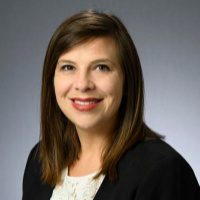
Jennifer McKeehan is a global operations and supply chain executive with more than 15 years of experience across retail and e-commerce channels. In August of 2022 she was named Senior Vice President of End-to-End Delivery at Walmart. In this role her scope of influence encompasses first, middle, and last mile fulfillment while embodying the culture to achieve the common purpose of saving people money so they can live better. Before coming to Walmart Jennifer served as Senior Vice President and Global Head of Supply Chain for Peloton Interactive leading the team responsible for all operational aspects of the Supply Chain including transformation across people, process, and technology. She oversaw sales and operations planning, distribution, transportation, inventory allocation, technology and final mile across all channels including connected fitness, accessories, and apparel. Jennifer was also Vice President, Supply Chain for The Home Depot leading the inventory planning and replenishment supply chain functions as well as digitization and integrated decision making for all fulfillment channels across stores and online, managing $15B+ of inventory. Featured on Atlanta Business Journal’s 40 Under 40, Georgia Tech 40 under 40, Wall Street Journal and Harvard Business School guest speaker. Jennifer is also a member of Leadership Atlanta Class of 2020. In her personal time, Jennifer serves on the Emerging Leaders Committee for Children’s Healthcare of Atlanta, cheering on Georgia Tech football and spending time with her husband and four children. Jennifer has a bachelor’s degree in industrial engineering from Georgia Tech and lives in Midtown. Connect with Jennifer on LinkedIn.

Allison Krache Giddens has been with Win-Tech, a veteran-owned small business and aerospace precision machine shop, for 15 years, recently buying the company from her mentor and Win-Tech’s Founder, Dennis Winslow. She and her business partner, John Hudson now serve as Co-Presidents, leading the 33-year old company through the pandemic.
She holds undergraduate degrees in psychology and criminal justice from the University of Georgia, a Masters in Conflict Management from Kennesaw State University, a Masters in Manufacturing from Georgia Institute of Technology, and a Certificate of Finance from the University of Georgia. She also holds certificates in Google Analytics, event planning, and Cybersecurity Risk Management from Harvard online. Allison founded the Georgia Chapter of Women in Manufacturing and currently serves as Treasurer. She serves on the Chattahoochee Technical College Foundation Board as its Secretary, the liveSAFE Resources Board of Directors as Resource Development Co-Chair, and on the Leadership Cobb Alumni Association Board as Membership Chair and is also a member of Cobb Executive Women. She is on the Board for the Cobb Chamber of Commerce’s Northwest Area Councils. Allison runs The Dave Krache Foundation, a non-profit that helps pay sports fees for local kids in need. Connect with Allison on LinkedIn.
